Internet Happenings, Events and Sources
| Marcus P. Zillman, M.S., A.M.H.A. Author/Speaker/Consultant Internet Happenings, Events and Sources |
|
Saturday, April 30, 2005 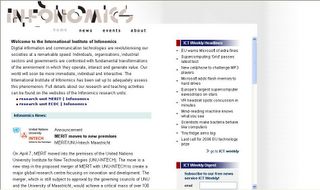 International Institute of Infonomics International Institute of Infonomics http://www.infonomics.nl/ Digital information and communication technologies are revolutionising our societies at a remarkable speed. Individuals, organisations, industrial sectors and governments are confronted with fundamental transformations of the environment in which they operate, interact and generate value. Our world will soon be more immediate, individual and interactive. The International Institute of Infonomics has been set up to adequately assess this phenomenon. Full details about their research and teaching activities can be found on the websites of the Infonomics research units: 1) research unit MERIT Infonomics, 2) research unit ECDC Infonomics. This has been added to Research Resources Subject Tracer™ Information Blog. This has been added to Directory Resources Subject Tracer™ Information Blog. posted by Marcus | 4:25 AM  opensourceCMS - Try Before You Install http://www.opensourcecms.com/ This site was created with one goal in mind. To give you the opportunity to "try out" some of the best php/mysql based free and open source software systems in the world. You are welcome to be the administrator of any site here, allowing you to decide which system best suits your needs. The administrator username and password is given for every system and each system is deleted and re-installed every two hours. This allows you to to add and delete content, change the way things look, basically be the admin of any system here without fear of breaking anything. At the upper left hand side of your screen you will see a clock that is counting down. What it shows is how much time is left in this two hour demo window. Once the clock hits 00:00:00, opensourceCMS.com will shut down and the demos will be completely refreshed. This takes about 5 minutes, and afterwards opensourceCMS.com will re-activate and the demo's will appear as fresh installations ready to be demo'ed again.. This has been added to World Wide Web Reference Subject Tracer™ Information Blog. posted by Marcus | 4:20 AM CiteSeer - Scientific Literature Digital Library and Search Engine http://citeseer.ist.psu.edu/ CiteSeer is a scientific literature digital library and search engine that focuses primarily on the literature in computer and information science. CiteSeer aims to improve the dissemination and feedback of the scientific literature and to provide improvements in functionality, usability, availability, cost, comprehensiveness, efficiency, and timeliness in the access of scientific and scholarly knowledge. CiteSeer was developed at the NEC Research Institute by Steve Lawrence, Lee Giles and Kurt Bollacker. It is currently hosted at Penn State's School of Information Sciences and Technology under the direction of Professor Lee Giles. Isaac Councill is the CiteSeer adminstrator. The CiteSeer model is portable with a very similar search engine, SmealSearch, created for academic business documents. Rather than creating just another digital library, CiteSeer attempts to provide algorithms, metadata, services, techniques, and software that can be used in other digital libraries. CiteSeer indexes PostScript and PDF research articles on the Web. This will be added to Academic and Scholar Search Engines and Sources Annotated White paper Link Compilation. This will be added to Academic Resources 2005 Internet MiniGuide. This has been added to Research Resources Subject Tracer™ Information Blog. posted by Marcus | 4:15 AM  Google - My Search History https://www.google.com/searchhistory/ Ever find what you're looking for with Google, then promptly forget what you found? If so, you'll enjoy My Search History, a new service on Google Labs which lets you view and manage your search history from any computer via "My Search History" links in the upper-right corner of your Google home page and search results pages. My Search History shows you all the searches you've done on Google and the search results you've clicked on, and presents this information in ways we think are most useful. If you don't remember an exact search query, for instance, but you do remember when you did the search, you can use My Search History's calendar feature to check the searches you did on a given day and navigate to any of them with a single click. Full-text search over your history means you can easily find any search query or results page. They also show you related history over time; you can review everything Google has ever shown you about "apples", "bass fishing" or "the wizard of oz," for instance, by clicking the "Related history" link next to any search term when it appears. My Search History also gives you useful info while you're searching on Google. Next to your search results, you'll see how many times you've visited a certain search result and the last time you viewed it. And if we think it will help you find what you're looking for, they will grab pages you've already clicked on and put them above your regular web results. posted by Marcus | 4:10 AM  CITIDEL http://www.citidel.org/ CITIDEL is for you regardless of your age or occupation and if you are into computing, CITIDEL has something for you. Students can find definitions, demonstrations, pictures and applets, and materials for review and to get ahead. Teachers and professors will find plenty of materials to support their courses, plus tools to compose them into lists or lesson plans for students to access directly, or even to use right in the classroom! Researchers will enjoy a huge catalog and bibliography of the latest research and historical archives, culled from big names such as ACM Digital Library, DBLP, and CiteSeer. Professionals will find e-courses and tutorials, as well as articles and research publications to stay up-to-speed in the computing field. This has been added to Research Resources Subject Tracer™ Information Blog. This has been added to Student Research Resources Subject Tracer™ Information Blog. This will be added to Academic Resources 2005 Internet MiniGuide. posted by Marcus | 4:05 AM eBizSearch http://gunther.smeal.psu.edu/ eBizSearch is an experimental niche search engine that searches the web and catalogs academic articles as well as commercially produced articles and reports that address various business and technology aspects of e-Business. The search engine crawls websites of universities, commercial organizations, research institutes and government departments to retrieve academic articles, working papers, white papers, consulting reports, magazine articles, and published statistics and facts. For certain documents, the database only stores the hyperlinks to those documents. eBizSearch performs a citation analysis of all the academic articles accessed and lists them in order of their citation rates in academic papers (the most cited articles are listed first). Articles available through the eBizSearch engine can be downloaded (for fair use) without any charges. However, some articles may have only the abstracts listed, and may have to be purchased directly from the appropriate sources. This will be added to Academic and Scholar Search Engines and Sources Annotated White paper Link Compilation. This will be added to Academic Resources 2005 Internet MiniGuide. This has been added to Business Intelligence Resources Subject Tracer™ Information Blog. posted by Marcus | 4:00 AM Friday, April 29, 2005 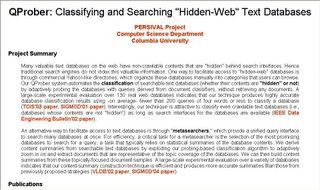 QProber QProber: Classifying and Searching "Hidden-Web" Text Databases http://qprober.cs.columbia.edu/ Project Summary Many valuable text databases on the web have non-crawlable contents that are "hidden" behind search interfaces. Hence traditional search engines do not index this valuable information. One way to facilitate access to "hidden-web" databases is through commercial Yahoo!-like directories, which organize these databases manually into categories that users can browse. Our QProber system automates the classification of searchable text databases (whether their contents are "hidden" or not) by adaptively probing the databases with queries derived from document classifiers, without retrieving any documents. A large-scale experimental evaluation over 130 real web databases indicates that our technique produces highly accurate database classification results using -on average- fewer than 200 queries of four words or less to classify a database (TOIS'03 paper; SIGMOD'01 paper). Interestingly, our technique is attractive to classify even crawlable text databases (i.e., databases whose contents are not "hidden") as long as search interfaces for the databases are available (IEEE Data Engineering Bulletin'02 paper). An alternative way to facilitate access to text databases is through "metasearchers," which provide a unified query interface to search many databases at once. For efficiency, a critical task for a metasearcher is the selection of the most promising databases to search for a query, a task that typically relies on statistical summaries of the database contents. We derive content summaries from searchable text databases by exploiting our probing-based classification algorithm to adaptively zoom in on and extract documents that are representative of the topic coverage of the databases. We can then build content summaries from these topically-focused document samples. A large-scale experimental evaluation over a variety of databases indicates that our content-summary construction technique is efficient and produces more accurate summaries than those from previously proposed strategies (VLDB'02 paper, SIGMOD'04 paper). Panagiotis G. Ipeirotis recommended the following papers from their comprehensive database: http://qprober.cs.columbia.edu/publications/icde2005-abstract.html http://qprober.cs.columbia.edu/publications/tois2003-abstract.html http://qprober.cs.columbia.edu/publications/vldb2002-abstract.html This has been aded to Deep Web Research Subject Tracer™ Information Blog. posted by Marcus | 4:25 AM  ClassRoomDoor.com - Online Computer Courses – Computer Training http://www.classroomdoor.com/ Classroomdoor.com is your source for over 1,600 online courses to help you meet all of your computer training needs. Advance your career or get a better job - make more money - by acquiring new skills or improving current skills. Our online computer courses range from Microsoft Office Training Courses to learning how to start a small business, personal and professional growth. This has been added to Tutorial Resources Subject Tracer™ Information Blog. posted by Marcus | 4:20 AM  CERN Workshop on Innovations in Scholarly Communication (OAI4) http://oai4.web.cern.ch/OAI4/ The CERN Workshop on Innovations in Scholarly Communication (OAI4)has been announced. This fourth workshop in the series, which began life as the Open Archives Initiative Workshop in 2001, is a forum for technical issues associated with scholarly communication. OAI4 will be held at CERN in Geneva, Switzerland from the 20th to the 22nd October 2005. posted by Marcus | 4:15 AM  XMethods - Publicly Available Web Services http://www.xmethods.com/ Emerging web services standards such as SOAP, WSDL and UDDI will enable system-to-system integration that is easier than ever before. This site lists publicly available web services. Access XMethods through a variety of interfaces: 1) UDDI v2, 2) WS-Inspection, 3) RSS, 4) SOAP, and 5) DISCO. This has been added to Research Resources Subject Tracer™ Information Blog. This has been added to eCommerce Resources Subject Tracer™ Information Blog. This has been added to World Wide Web Reference Subject Tracer™ Information Blog. posted by Marcus | 4:10 AM  AutoStitch AutoStitch - A New Dimension In Automatic Image Stitching http://www.cs.ubc.ca/~mbrown/autostitch/autostitch.html AutoStitch is the world's first fully automatic 2D image stitcher. Capable of stitching full view panoramas without any user input whatsoever, AutoStitch is a breakthrough technology for panoramic photography, VR and visualisation applications. AutoStitch is built using cutting edge research from the AI lab at UBC, but it's incredibly simple to use! Just select a set of photos, and AutoStitch does the rest: digital photos in, panoramas out. Try the free demo (for Windows). For more examples of panoramas stitched using AutoStitch, please see our Panorama Gallery. AutoStitch is the product of two years of research by Matthew Brown and David Lowe at the University of British Columbia. For details and research papers please see our panorama research page. This has been added to Artificial Intelligence Resources Subject Tracer™ Information Blog. posted by Marcus | 4:05 AM  Archives of Medical Research http://www.sciencedirect.com/science/journal/01884409 Official Publication of the Instituto Mexicano del Seguro Social (IMSS). Former title: Archives de Investigación Médica. Archives of Medical Research publishes original peer-reviewed medical research in an attempt to bridge the gaps created by medical specialization. Contributions are grouped into three main categories - biomedical, clinical, and epidemiological. Review articles, outstanding case reports, and preliminary communications will also be considered. As an international publication, the study of diseases is presented from various perspectives to provide the medical community with original investigation from molecular biology to clinical epidemiology within a single publication. Publisher: Elsevier This has been added to Healthcare Resources Subject Tracer Information Blog. This will be added to Healthcare Resources 2005 Internet MiniGuide. posted by Marcus | 4:00 AM Thursday, April 28, 2005 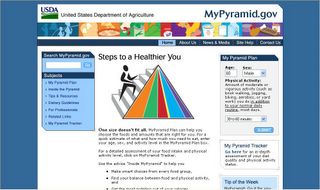 MyPyramid.gov - United States Department of Agriculture MyPyramid.gov - USDA http://foodpyramid.gov/ One size doesn't fit all. MyPyramid Plan can help you choose the foods and amounts that are right for you. For a quick estimate of what and how much you need to eat, enter your age, sex, and activity level in the MyPyramid Plan box. For a detailed assessment of your food intake and physical activity level, click on the MyPyramid Tracker. Use the advice "Inside MyPyramid" to help you: a) Make smart choices from every food group, b) Find your balance between food and physical activity, and c) Get the most nutrition out of your calories. This will be added to Healthcare Resources 2005 Internet MiniGuide. This has been added to Agriculture Resources Subject Tracer™ Information Blog. posted by Marcus | 4:25 AM  ExRx (Exercise Prescription) on the Net http://www.exrx.net/ ExRx.net is a exercise resource of nearly 1500 pages for the exercise professional, coach, or fitness enthusiast. ExRx.net features a comprehensive exercise instruction and kinesiology reference for exercise prescription with over 500 animated exercises demonstrated, described, and analyzed. This will be added to Healthcare Resources Resources 2005 Internet MiniGuide. posted by Marcus | 4:20 AM  Montage-a-google http://grant.robinson.name/projects/montage-a-google/ Montage-a-google is a simple web-based app that uses Google's image search to generate a large gridded montage of images based on keywords (search terms) entered by the user. Not only an interesting way of browsing the net, it can also be used to create desktop pictures or even posters (see examples below - more coming soon). Guess-the-google http://grant.robinson.name/projects/guess-the-google/ After creating Montage-a-google, several people wrote to Grant suggesting he make a game based on the same technology. Guess-the-google reverses this process by picking the keywords for you, the player must then guess what keyword made up the image - it's surprisingly addictive. posted by Marcus | 4:15 AM 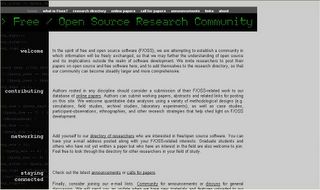 Free/Open Source Research Community Hybrid Innovation - How Does the Collaboration Between the FLOSS Community and Corporations Happen? by Yuwei Lin http://opensource.mit.edu/papers/lin4_hybrid.pdf Abstract Unlike innovation based on a strong professional culture involving close collaboration between professionals in academia and/or corporations, the current Free/Libre Open Source Software (FLOSS) development entails a global knowledge network, which consists of 1) a heterogeneous community of individuals and organisations who do not necessarily have professional backgrounds in computer science but competent skills to understand programming and working in a public domain; 2) corporations. This paper highlights the importance of the hybrid form of developing and implementing software, and also identifies several key factors shaping the collaboration between OSS firms and the community. posted by Marcus | 4:10 AM Scientific Impact Quantity and Quality: Analysis of Two Sources of Bibliographic Data by R.K.Belew http://arxiv.org/PS_cache/cs/pdf/0504/0504036.pdf Abstract: Attempts to understand the consequence of any individual scientist's activity within the long-term trajectory of science is one of the most difficult questions within the philosophy of science. Because scientific publications play such as central role in the modern enterprise of science, bibliometric techniques which measure the ``impact'' of an individual publication as a function of the number of citations it receives from subsequent authors have provided some of the most useful empirical data on this question. Until recently, Thompson/ISI has provided the only source of large-scale ``inverted'' bibliographic data of the sort required for impact analysis. In the end of 2004, Google introduced a new service, GoogleScholar, making much of this same data available. Here we analyze 203 publications, collectively cited by more than 4000 other publications. We show surprisingly good agreement between data citation counts provided by the two services. Data quality across the systems is analyzed, and potentially useful complementarities between are considered. The additional robustness offered by multiple sources of such data promises to increase the utility of these measurements as open citation protocols and open access increase their impact on electronic scientific publication practices. This has been added to Research Resources Subject Tracer™ Information Blog. posted by Marcus | 4:05 AM  Internet Filtering in China in 2004-2005: A Country Study http://www.opennetinitiative.net/studies/china/ The OpenNet Initiative tested China's Internet filtering of web content, blog postings, and e-mail correspondences. Their testing found efforts to prevent access to a wide range of sensitive materials, from pornography to religious material to political dissent. Unlike the filtering systems in many other countries, China’s filtering regime appears to be carried out at various control points and also to be changing over time. China operates the most extensive, technologically sophisticated, and broad-reaching system of Internet filtering in the world. China’s intricate technical filtering regime is buttressed by an equally complex series of laws and regulations that control the access to and publication of material online. However, ONI found that most major American media sites, such as CNN, MSNBC, and ABC, are generally available in China (though the BBC remains blocked). Moreover, most sites we tested in their global list’s human rights and anonymizer categories are accessible as well. This has been added to International Trade Resources 2005 Internet MiniGuide. posted by Marcus | 4:00 AM Wednesday, April 27, 2005 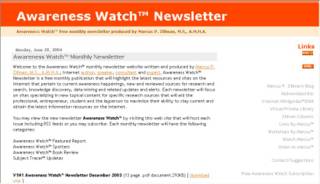 Awareness Watch™ Newsletter V3N5 May 2005 Awareness Watch™ Newsletter V3N5 May 2005 http://virtualprivatelibrary.blogspot.com/Awareness Watch V3N5.pdf Awareness Watch™ Newsletter Blog and Archives http://www.AwarenessWatch.com/ The May 2005 V3N5 Awareness Watch™ Newsletter is a freely available 32 page .pdf document (668KB) from the above URL. The Awareness Watch Featured Report this month highlights a comprehensive listing of online resources, sources and sites covering all areas of research resources for students. The Awareness Watch Spotters cover many excellent and newly released annotated current awareness research sources and tools as well as the latest identified Internet happenings and resources. The book review covers Eric von Hippel's Democratizing Innovation (MIT Press, 2005).  posted by Marcus | 10:20 AM 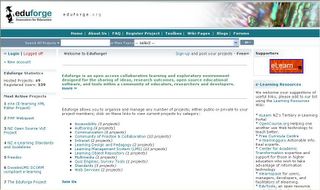 Eduforge Eduforge http://eduforge.org/ Eduforge is a virtual collaborative learning and exploratory environment designed for the sharing of ideas, research outcomes, open source educational software, and tools within a community of educators, researchers and developers. It is an open access resource allowing anyone with an interest in the exploration of teaching and learning to join the community. Eduforge encourages cross-institutional collaboration among individuals within an independent environment outside the normal boundaries of organisational infrastructure and resources. The Eduforge community is well supported by online communication, content and management tools, including Wiki tools, project management, forum, surveys, Concurrent Versions System (CVS), and document uploading and sharing. This has been added to Research Resources Subject Tracer™ Information Blog. posted by Marcus | 4:25 AM  Browser Archive http://browsers.evolt.org/ One of the founding members of evolt.org, Adrian Roselli has provided this browser archive as well as its support through his company, Algonquin Studios. You can see more information at his archive announcement. This has been added to the tools section of Research Resources Subject Tracer™ Information Blog. posted by Marcus | 4:20 AM Summarization from Medical Documents: A Survey http://arxiv.org/ftp/cs/papers/0504/0504061.pdf The aim of this paper is to survey the recent work in medical documents summarization. During the last decade, documents summarization got increasing attention by the AI research community. More recently it also attracted the interest of the medical research community as well, due to the enormous growth of information that is available to the physicians and researchers in medicine, through the large and growing number of published journals, conference proceedings, medical sites and portals on the World Wide Web, electronic medical records, etc. This survey gives first a general background on documents summarization, presenting the factors that summarization depends upon, discussing evaluation issues and describing briefly the various types of summarization techniques. It then examines the characteristics of the medical domain through the different types of medical documents. Finally, it presents and discusses the summarization techniques used so far in the medical domain, referring to the corresponding systems and their characteristics. The paper discusses thoroughly the promising paths for future research in medical documents summarization. It mainly focuses on the issue of scaling to large collections of documents in various languages and from different media, on personalization issues, on portability to new sub-domains, and on the integration of summarization technology in practical applications. posted by Marcus | 4:15 AM  Ocean Portal http://ioc.unesco.org/oceanportal/index.php Ocean Portal is a high-level directory of Ocean Data and Information related web sites. Its objective is to help scientists and other ocean experts in locating such data & information. The IOC/IODE Marine Data Training Team is grateful to the many (sometimes anonymous) compilers of ocean lists, whose work we have surveyed in the creation of this Portal. In the case of general 'marine science' lists, we have tried to add structure to the many useful links you have identified; in the case of specialized lists, we hope that the larger view provided here is appreciated, albeit with somewhat different categories. This has been added to Research Resources Subject Tracer™ Information Blog. posted by Marcus | 4:10 AM  Hubble Public Talks http://hubblesite.org/about_us/public-talks.shtml Are you interested in planets, stars, galaxies, black holes? Listen to the latest and previous talks on what the Hubble Telescope is doing and its research into the Cosmos. The HubbleSite is also a very interesting place to receive all the latest news and happenings in relationship to the Hubble Telescope! This has been added to the Astronomy Resources Subject Tracer™ Information Blog. posted by Marcus | 4:05 AM  How To Use CHADDB, A Free Database For Non-Profits and Churches http://searchenterpriselinux.techtarget.com/tip/0,289483,sid39_gci1073846,00.html When a new product is announced, the word goes out about its features. If the product sounds like a good thing, then you wonder, "What would it be like to use it?" SearchEnterpriseLinux.com's new product how-to series answers that question. Each how-to starts out with the basics -- product and vendor name, price, etc. -- and then gets down to business with a short how-to. This how-to was written by Don Parris, CHADDB developer and minister at Oakdale Christian Fellowship. posted by Marcus | 4:00 AM Tuesday, April 26, 2005 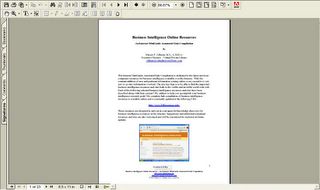 Business Intelligence Online Resources by Marcus P. Zillman, M.S., A.M.H.A. Business Intelligence Online Resources  http://VirtualPrivateLibrary.BlogSpot.com/Business Intelligence Online Resources.pdf Internet Annotated Link Compilation white paper titled "Business Intelligence Online Resources" is a 24 page research paper listing selected resources both new and existing for online business intelligence. Each source is described along with the URL address than can be accessed. It is freely available as a .pdf file (531KB) at the above link from the Virtual Private Library™ and authored by Marcus P. Zillman, M.S., A.M.H.A. It was updated 09-12-06. Other white papers are available by clicking here. Purchase 81 Page Professional Internet MiniGuide titled Market Intelligence Resources 2006 by clicking here.  posted by Marcus | 6:32 PM 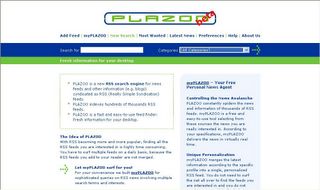 PLAZOO - RSS Search Engine PLAZOO - RSS Search Engine http://www.plazoo.com/ PLAZOO is a new RSS search engine for news feeds and other information (e.g. blogs) syndicated as RSS (Really Simple Syndication) feeds. PLAZOO indexes hundreds of thousands RSS feeds. PLAZOO is a fast and easy-to-use feed finder: Fresh information for your desktop. With RSS becoming more and more popular, finding all the RSS feeds you are interested in is highly time consuming. You have to surf multiple feeds on a daily basis, because the RSS feeds you add to your reader are not merged. They have built myPLAZOO for sophisticated queries on RSS news involving multiple search terms and interests. It filters the news you are interested in on the fly. Every query can be saved as RSS feed and also be easily added to your external RSS reader. Updates are performed on an hourly basis. This will be added to the search engine section of all the 2005 Internet MiniGuides. This has been added to the online resources of my Bots, Blogs and News Aggregators presentation site. posted by Marcus | 4:25 AM  Thefacebook - Online College Social Networks Directory http://www.thefacebook.com/ Thefacebook is an online directory that connects people through social networks at colleges. For a complete list of supported schools, click here. Your facebook is limited to your own college or university. You can use Thefacebook to: a) Search for people at your school, b) Find out who is in your classes, c) Look up your friends' friends, and d) See a visualization of your social network. This has been added to Social Informatics Subject Tracer™ Information Blog. posted by Marcus | 4:20 AM  Combining RDF and OWL with SOAP for Semantic Web http://www.ida.liu.se/~yuxzh/doc/ncws-041002.pdf Abstract by Authors: This paper has two contributions: (1) we attempt to propose that a combination of RDF and OWL with SOAP is useful for building semantic Web services (SWS); (2) we show how to combine them technically. A SOAP Envelope comprises Header (control data) and Body (transaction data). They are defined in XML schema syntactically not semantically, resulting in inflexibility for Web services invocation. RDF and OWL introduce ontology-based semantics into SOAP. We provide four-level SWS. This has been addded to the Semantic Web Research section of Deep Web Research Subject Tracer™ Information Blog. posted by Marcus | 4:15 AM  Programmingtutorials.com - Free Online Programming Tutorials http://www.programmingtutorials.com/ You will find over 300 programming language tutorials, lessons, and how-to's. You can surf through their collection of free online tutorials or read postings in one of their forums. Just choose the language you are interested in learning, find a lesson and enjoy! This has been added to Tutorial Resources Subject Tracer™ Information Blog. posted by Marcus | 4:10 AM  GLORIAD Global Ring Network for Advanced Applications Development http://www.gloriad.org/ GLORIAD provides scientists around the globe with advanced networking tools that improve communications and data exchange, enabling active, daily collaboration on common problems. With GLORIAD, the scientific community can move unprecedented volumes of valuable data effortlessly, stream video and communicate through quality audio- and video-conferencing. GLORIAD exists today due to the shared commitment of the US, Russia, China, Korea, Canada and the Netherlands to promote increased engagement and cooperation between their countries, beginning with their scientists, educators and young people. The benefits of this advanced network are shared with S&E communities throughout Europe, Asia and the Americas. GLORIAD provides more than a network; it provides a stable, persistent, non-threatening means of facilitating dialog and increased cooperation between nations that have often been at odds through the past century. This new era of cooperation will provide benefits not only to the S&E communities but to every citizen in the partner countries through: 1) Improved weather forecasting and atmospheric modeling through live sharing of monitoring data; 2) New discoveries into the basic nature and structure of the universe through advanced network connections between high energy physicists and astronomers - and the expensive facilities GLORIAD makes it possible to share; 3) Support of the global community building the International Thermonuclear Experimental Reactor (ITER), creating a technology which will someday provide a pactically limitless supply of energy; 4) Advancing joint geological sciences related to seismic monitoring and earthquake prediction; 5) Enabling new joint telemedical applications and practices; 6) Strengthening current programs in nuclear weapons disposal, nuclear materials protection, accounting and control and active discussions on combating terrorist threats; and 7) Increasing classroom to-to-classroom cooperation to accessible scientists and students in other countries through the 24/7 EduCultural Channel, the “Virtual Science Museum of China,” the Russia-developed “Simple Words ” global essay contest, and a special partnership with International Junior Achievement. These are a small sample of the literally hundreds of active collaborations served by both the general and advanced network services provided by GLORIAD. This has been added to Research Resources Subject Tracer™ Information Blog. This has been added to Student Research Resources Subject Tracer™ Information Blog. posted by Marcus | 4:05 AM  W3C Track Featured at WWW2005 http://www.w3.org/2005/01/w3c-track05.html http://www2005.org/ http://www.w3.org/2005/04/www2005-pressrelease The W3C Track chaired by Marie-Claire Forgue runs from 11-13 May at the Fourteenth International World Wide Web Conference (WWW2005) in Chiba, Japan. W3C Members and Team present three days of content on W3C technologies and achievements. Conference attendees are also invited to Developers Day presentations on 14 May. posted by Marcus | 4:00 AM Monday, April 25, 2005  SLA Asian Chapter News http://VirtualPrivateLibrary.BlogSpot.com/SLA_Asia_Chapter_News_V2N1.pdf The SLA Asian Chapter News (the official newsletter of the Asian Chapter of the Special Libraries Association) V2N1 January - March 2005 had an article on Zillman's Resources Page 4 and 5 written by the Chapter's President Jane Macoustra. She reviewed a number of my freely available resources and I greatly appreciated her last paragraph of the article: " I have only just touched the surface of the riches you can locate on Marcus Zillman's web pages, so go and check out this site. You will be pleasantly surprised by the amount of free, reliable information that is available. One of the best things about finding sites like this is that you know that the information is authoritative, high quality information." posted by Marcus | 6:08 PM  May 2005 Zillman Column May 2005 Zillman Column - Sematic Web Research Resources http://VirtualPrivateLibrary.BlogSpot.com/Semantic Web May05 Column.pdf http://www.zillmancolumns.com/ The May 2005 Zillman Column is now available and is titled Semantic Web Research Resources. This May column is a comprehensive listing of semantic web research resources and sources on the World Wide Web. Many have stated that the semantic web is the future of the Internet and the way that the world wide web will be organized, searched and applied in the near future. These resources will allow you to discovery the latest knowledge about the semantic web as well as learn what is happening now that will affect the way that you utilize this phenomenal resource we call the Internet! Download this excellent 14 page free .pdf (339KB) column today and begin looking at the World Wide Web through a semantic eye!  © 2005 Marcus P. Zillman, M.S., A.M.H.A. posted by Marcus | 4:30 AM 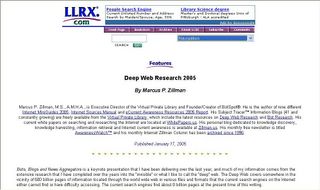 LLRX - Deep Web Research 2005 Feature Article This mp3 broadcast edition of Current Awareness Happenings on the Internet by Marcus P. Zillman, M.S., A.M.H.A. April 25, 2005 V3N17 discusses Deep Web Research. Click on the below audio mp3 broadcast to hear Marcus P. Zillman describing this article and resource that he authored and maintains. View these sites at: Deep Web Research http://www.llrx.com/features/deepweb2005.htm http://www.DeepWebResearch.info/  posted by Marcus |
4:27 AM
posted by Marcus |
4:27 AM
 Canadian Geographic Atlas Online Canadian Atlas Online http://canadiangeographic.ca/atlas/intro.aspx?lang=En The Royal Canadian Geographical Society proudly presents a groundbreaking Internet achievement, The Canadian Atlas Online, which brings cartography to life with exciting graphics and animation. This state-of-the-art interactive atlas allows you to explore Canada in a way you’ve never experienced before, and helps the Society to fulfill their mission to make Canada better known. This has been added to Reference Resources Subject Tracer™ Information Blog. posted by Marcus | 4:25 AM  Finding Images Online: Directory of Web Image Sites http://www.berinsteinresearch.com/fiolinks.htm This site was found on the Metro Desk Blog and titled Finding Images Online: Directory of Web Image Sites is a list, organized alphabetically by subject, of Web sources of pictures. The list does not indicate the criteria for inclusion, nor does it in any way imply that sources will allow free use of the images. However, this could be a useful guide for finding an elusive image. The list was compiled by Paula Berinstein, a librarian and writer. This will be added to the search engine section of all the 2005 Internet MiniGuides. posted by Marcus | 4:15 AM  Social Bookmarking Tools (I) - A General Review by Tony Hammond, Timo Hannay, Ben Lund, and Joanna Scott http://www.dlib.org/dlib/april05/hammond/04hammond.html Because, to paraphrase a pop music lyric from a certain rock and roll band of yesterday, "the Web is old, the Web is new, the Web is all, the Web is you", it seems like we might have to face up to some of these stark realities [n1]. With the introduction of new social software applications such as blogs, wikis, newsfeeds, social networks, and bookmarking tools (the subject of this paper), the claim that Shelley Powers makes in a Burningbird blog entry [1] seems apposite: "This is the user's web now, which means it's my web and I can make the rules." Reinvention is revolution – it brings us always back to beginnings. This paper reviews some current initiatives, as of early 2005, in providing public link management applications on the Web – utilities that are often referred to under the general moniker of 'social bookmarking tools'. There are a couple of things going on here: 1) server-side software aimed specifically at managing links with, crucially, a strong, social networking flavour, and 2) an unabashedly open and unstructured approach to tagging, or user classification, of those links. A number of such utilities are presented here, together with an emergent new class of tools that caters more to the academic communities and that stores not only user-supplied tags, but also structured citation metadata terms wherever it is possible to glean this information from service providers. This provision of rich, structured metadata means that the user is provided with an accurate third-party identification of a document, which could be used to retrieve that document, but is also free to search on user-supplied terms so that documents of interest (or rather, references to documents) can be made discoverable and aggregated with other similar descriptions either recorded by the user or by other users. This has been added to Social Informatics Subject Tracer™ Information Blog. posted by Marcus | 4:10 AM  VideoHelp.com http://www.videohelp.com/ This site will help you to make your own VideoCDs, SVCDs or DVDs that can be played on your standalone DVD Player from video sources like DVD, Video, TV, DV, Cam or downloaded movie clips like DivX, MOV, RM, WMV and ASF. We also have extensive lists of Capture Cards, DVD Media, computer DVD Writers, desktop DVD Recorders and desktop DVD Players with features, compatibility information and user comments. This has been added to Tutorial Resources Subject Tracer™ Information blog. posted by Marcus | 4:05 AM  Meetro http://meetro.com/index.php Meetro is the new online meeting place that lets you find friends and new people, events, restaurants and all sorts of other stuff – based on wherever you are when you're using Meetro. At the coffeeshop, the airport lounge, your best friend's couch… Meetro goes where you go, hooking you up with whoever and whatever's local. You can chat with your buddies on all the standard online networks – AIM, Yahoo, ICQ – and meet new Meetro users in your vicinity. You can create your own profile, check out your friends' profiles and share photo galleries. And best of all, you can see who's online locally and what's going on in your neighborhood – whether you're out of town or right next door. This has been added to Social Informatics Subject Tracer™ Information Blog. posted by Marcus | 4:05 AM Sunday, April 24, 2005 3-D Simulations 1) Stanford University: Folding@home http://folding.stanford.edu/ 2) Center for Automation in Nanobiotech: Nanorobotics http://www.nanorobotdesign.com/ 3) University of Texas Austin: Robotics Research Group http://www.robotics.utexas.edu/simulations/ 4) EdCenter: Interactive 3D Modelling http://www.edcenter.sdsu.edu/geowall/ 5) EuclideanSpace: Building a 3D World http://www.euclideanspace.com/ 6) The Breve Simulation Environment http://www.spiderland.org/breve/ 7) Cyberbotics, Ltd.: Webots™ http://www.cyberbotics.com/publications/ars.pdf Three-dimensional (3-D) rendering and animation technology is not only used for entertainment, but also for research and educational purposes. The technology can be used for purposes of scientific simulation in fields such as physics, biology, or chemistry. For example, Stanford University's Folding@home project (1) uses 3-D simulations and distributed computing to study protein folding, misfolding, aggregation, and related diseases. Three-D simulations can also be used to observe phenomena that would normally be impossible to scrutinize in detail, as is demonstrated on this website on Nanorobotics (2). This next website describes work by the Robotics Research Group (3) in using 3-D simulations to enhance undergraduate and graduate engineering education. The EdCenter (4) makes available several compressed files of 3-D simulations that model earthquake data, Mars, a San Diego Fly Through, and more. On this website (5 ), Martin Baker provides "all you need to know about 3D theory" and this website (6) provides access to a free open-source software package which "makes it easy to build 3-D simulations of decentralized systems and artificial life." This last article from Cyberbotics, Ltd. (7) discusses how mobile robotics simulation programs can be used to design robots. [From The NSDL Scout Report for Math, Engineering, and Technology, Copyright Internet Scout Project 1994-2005. http://scout.wisc.edu/] posted by Marcus | 4:25 AM  Genographic Project http://www3.nationalgeographic.com/genographic/ The National Geographic Society, IBM, geneticist Spencer Wells, and the Waitt Family Foundation have launched the Genographic Project, a five-year effort to understand the human journey—where we came from and how we got to where we live today. This unprecedented effort will map humanity's genetic journey through the ages. The fossil record fixes human origins in Africa, but little is known about the great journey that took Homo sapiens to the far reaches of the Earth. How did we, each of us, end up where we are? Why do we appear in such a wide array of different colors and features? Such questions are even more amazing in light of genetic evidence that we are all related—descended from a common African ancestor who lived only 60,000 years ago. Though eons have passed, the full story remains clearly written in our genes—if only we can read it. With your help, we can. When DNA is passed from one generation to the next, most of it is recombined by the processes that give each of us our individuality. But some parts of the DNA chain remain largely intact through the generations, altered only occasionally by mutations which become "genetic markers." These markers allow geneticists like Spencer Wells to trace our common evolutionary timeline back through the ages. "The greatest history book ever written," Wells says, "is the one hidden in our DNA." This has been added to Biological Informatics Subject Tracer&ttrade; Information Blog. posted by Marcus | 4:20 AM Gravatar http://www.gravatar.com/ A gravatar, or globally recognized avatar, is quite simply an 80×80 pixel avatar image that follows you from weblog to weblog appearing beside your name when you comment on gravatar enabled sites. Avatars help identify your posts on web forums, so why not on weblogs? Stay up to date with The Gravatar Weblog. posted by Marcus | 4:15 AM 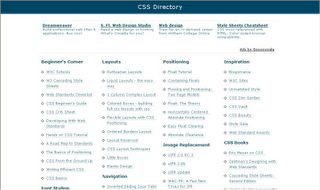 CSS Directory CSS Directory http://www.roderickhoward.com/cssdirectory/ CSS Directory - Your one stop resource for css links, articles, tutorials, examples, tips, layouts, hacks, books, and web standards. Sections include: 1) Beginner's Corner, 2) Font Styling, 3) Form Styling, 4) List Styling, 5) Layouts, 6) Navigation, 7) Hacks/Fixes, 8) Positioning, 9) Image Placement, 10) Discussion, 11) Inspiration, 12) CSS Books, 13) Validation, and 14) Tools. This has been added to World Wide Web Reference Subject Tracer™ Information Blog. posted by Marcus | 4:10 AM  Open Source Marketing http://www.changethis.com/14.OpenSourceMktg You've probably heard the term and wondered what marketing has to do with Linux. Turns out, everything. Read James' manifesto to find out where marketers go next. This will be added to Advertising, Marketing and Public Relations Resources 2005 Internet MiniGuide. posted by Marcus | 4:05 AM  The Freesound Project http://freesound.iua.upf.edu/index.php The Freesound Project aims to create a huge collaborative database of audio snippets, samples, recordings, bleeps, ... released under the Creative Commons Sampling Plus License. The Freesound Project provides new and interesting ways of accessing these samples, allowing users to: a) browse the sounds in new ways using keywords, a "sounds-like" type of browsing and more; b) up and download sounds to and from the database, under the same creative commons license; and c) interact with fellow sound-artists! We also aim to create an open database of sounds that can also be used for scientific research. Many audio research institutions have trouble finding correctly licensed audio to test their algorithms. Many have voiced this problem, but so far there hasn't been a solution. This has been added to World Wide Web Reference Subject Tracer™ Information Blog. This has been added to Research Resources Subject Tracer™ Information Blog. posted by Marcus | 4:00 AM Saturday, April 23, 2005  O'Reilly CodeZoo http://www.codezoo.net/ CodeZoo exists to help you find high-quality, freely available, reusable components, getting you past the repetitive parts of coding, and onto the rest and the best of your projects. It’s a fast-forward button for your compiler. This has been added to Script Resources Subject Tracer™ Information Blog. posted by Marcus | 4:25 AM The W3C Markup Validation Service http://validator.w3.org/ The W3C Markup Validation Service is a free service that checks Web documents in formats like HTML and XHTML for conformance to W3C Recommendations and other standards. This has been added to World Wide Web Reference Subject Tracer™ Information Blog. posted by Marcus | 4:20 AM 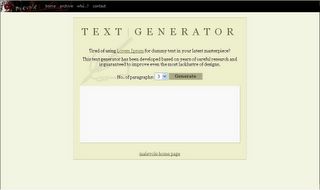 Text Generator Text Generator http://www.malevole.com/mv/misc/text/ Tired of using Lorem Ipsum for dummy text in your latest masterpiece? This text generator has been developed based on years of careful research and is guaranteed to improve even the most lacklustre of designs. This has been added to World Wide Web Reference Subject Tracer™ Information Blog. posted by Marcus | 4:15 AM  Information Technology and Management http://www.springerlink.com/link.asp?id=101768 By definition, information technology is very wide. There are a number of journals that address different technologies such as databases, knowledge bases, multimedia, group-ware, telecommunications, etc. This current trend is understandable because these technologies are indeed complex and often have a multitude of technical issues requiring in-depth study. On the other hand, business solutions almost always require integration of a number of these technologies. Therefore it is important to have a journal where the readers will be exposed not only to different technologies but also to their impact on information system design, functionality, operations and management. It should be emphasized that information systems include not only machines but also humans; therefore, the journal will be an outlet for studies dealing with man/machine interface, human factors and organizational issues. Furthermore, managerial issues arising from and dealing with management of information technology and systems including strategic issues are included in the domain of coverage. This has been added to Reference Resources Subject Tracer™ Information Blog. posted by Marcus | 4:10 AM  Jobs Blog: Librarians Reference These Sites When Seeking Work By Sarah E. Needleman http://snipurl.com/dzq5 Looking to expand your online job hunt beyond the big boards? Web sites and e-mail lists dedicated to postings in specific fields can supplement your search. Here's a look at niche job boards and e-mail newsletters from around the Web. This has been added to Employment Resources Subject Tracer™ Information Blog. posted by Marcus | 4:05 AM  Podscope® - The First Engine to Search Within a Podcast http://www.tveyes.com/about_us/news_articles/ps/psannounce.html http://www.Podscope.com/ TVEyes, the real-time broadcast search provider, today announced Podscope®, the first engine to search within a Podcast. TVEyes’ Podscope, which makes every word searchable within a podcast, enables the audio indexing of podcast content, which is equally applicable to video blogs and personal videos. Podcasts are essentially downloadable radio programs distributed through RSS that can be put onto a digital media music player or iPod. Podscope will be generally available later this month. TVEyes, which has been indexing television and radio broadcasts since 1999, crawls the web with Podscope looking for podcasts and creates an index against every word, thereby making the contents searchable. The user can search on a term, generate a list of results ranked by a variety of methods to find the most relevant podcast and click to play or click to download. With a looming explosion in such user generated rich content as Podcasts and video blogs, there is a growing need to empower consumers to find and subscribe to programs that meet their diverse interests, commented Allen Weiner, Vice President and Research Director at Gartner. Searching and indexing these varied audio and video programs will not only benefit content-hungry consumers, it also adds legitimacy and velocity to this burgeoning space. This has been added to the search engine section of the 2005 Internet MiniGuides. posted by Marcus | 4:00 AM Friday, April 22, 2005 Buzztracker http://www.buzztracker.org/ Buzztracker is software that visualizes frequencies and relationships between locations in the Google world news directory. Buzztracker tries to show you how interconnected the world is: big events in one area ripple to other areas across the globe. Connections between cities thousands of miles apart become apparent at a glance. Buzztracker only tracks English-language news sources. This will be added to Online Research Browsers Annotated White paper Link Compilation. posted by Marcus | 4:25 AM  Health Economics, Policy and Law http://journals.cambridge.org/jid_HEP International trends highlight the confluence of economics, politics and legal considerations in the health policy process. Health Economics, Policy and Law (HEPL) will serve as a forum for scholarship on health policy issues from these perspectives, and will be of use to academics, policy makers and health care managers and professionals. HEPL will be international in scope, will publish both theoretical and applied work, and will contain articles on all aspects of health policy. Considerable emphasis will be placed on rigorous conceptual development and analysis, and on the presentation of empirical evidence that is relevant to the policy process. This is a new Journal for 2006! This has been added to Healthcare Resources 2005 Internet MiniGuide. posted by Marcus | 4:20 AM 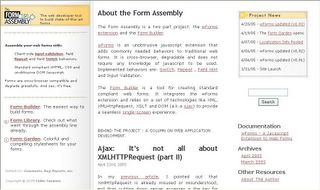 The Form Assembly The Form Assembly http://www.formassembly.com/ The Form Assembly is a two part project: the wForms extension and the Form Builder. wForms is an unobtrusive javascript extension that adds commonly needed behaviors to traditional web forms. It is cross-browser, degradable and does not require any knowledge of javascript to be used. Implemented behaviors are: Switch, Repeat , Field Hint and Input Validation. The Form Builder is a tool for creating standard compliant web forms. It integrates the wForms extension and relies on a set of technologies like XML, XMLHttpRequest, XSLT and DOM (a.k.a Ajax) to provide a seamless single-screen experience. This has been added to World Wide Web Reference Subject Tracer™ Information Blog. posted by Marcus | 4:15 AM  Duel of the Winds http://www.nsf.gov/news/news_summ.jsp?cntn_id=103182 When winds collide: A Wolf-Rayet star (WR) and its giant companion (O) do battle. Like two ancient storm gods using nature's weaponry to wage war, this pair of ultra-massive stars has sent their fierce stellar winds smashing together across a region the size of our solar system. Now, astronomers have used the National Science Foundation's Very Long Baseline Array of radio telescopes to track the moving collision zone. One of the combatants is a true behemoth weighing in at some 50 times the mass of our own Sun. But the other, a comparative lightweight having "only" 20 times the mass of Sun, belongs to a category known as Wolf-Rayet stars--meaning it is on the brink of exploding as a supernova. This has been added to Astronomy Resources Subject Tracer™ Information Blog. posted by Marcus | 4:10 AM  Upcoming.org http://upcoming.org/ Upcoming.org is a social event calendar, completely driven by people like you. Manage your events, share events with friends and family, and syndicate your calendar to your own site. As Upcoming.org learns more about the events you enjoy, it will suggest new events you never would have heard about. This has been added to Social Informatics Subject Tracer™ Information Blog. posted by Marcus | 4:05 AM  The Promise of Internet Intermediary Liability by Ronald J. Mann and Seth R. Belzley http://papers.ssrn.com/sol3/papers.cfm?abstract_id=696601 Abstract: The internet has transformed the economics of communication, creating a spirited debate as to the proper role of federal, state, and international governments in regulating conduct that relates to or involves the internet. Many have argued that internet communications should be entirely self-regulated - either because they cannot or should not be the subject of government regulation. The advocates of that approach would prefer a no-regulation zone around internet communications, based for the most part on the unexamined view that internet activity is fundamentally different in a way that justifies broad regulatory exemption. At the same time, it is undisputed that some kinds of activity that the internet facilitates violate widely shared norms and legal rules. State legislatures motivated by those concerns have begun to respond with internet-specific laws directed at particular contexts, giving little or no credence to the claims that the internet needs special treatment. This Essay starts from the realist assumption that government regulation of the internet is inevitable. Thus, instead of focusing on the naïve question of whether the internet should be regulated, it discusses how to regulate internet-related activity in a way that is consistent with approaches to analogous offline conduct. The Essay also assumes that the most salient characteristic of the internet is that it inserts intermediaries into relationships that could be, and previously would have been, conducted directly in an offline environment. Existing liability schemes generally join traditional fault-based liability rules to broad internet-specific liability exemptions. Those exemptions are supported by the premise that in many cases the conduct of the intermediaries is so wholly passive as to make liability inappropriate. We argue that the pervasive role of intermediaries calls not for a broad scheme of exoneration, premised on passivity, but rather for a more thoughtful development of principles for determining when and how it makes economic sense to allocate responsibility for wrongful conduct to the least cost avoider. Accordingly, in cases in which it is feasible for intermediaries to control the conduct, we recommend a framework that pays serious attention to the possibility of one of a series of three different schemes of intermediary liability. The final Part of the Essay uses that framework to analyze the propriety of intermediary liability for several kinds of internet-related misconduct including internet gambling, child pornography, the sale of counterfeit and contraband on the internet, and security harms. This has been added to eCommerce Resources Subject Tracer™ Information Blog. posted by Marcus | 4:00 AM Thursday, April 21, 2005 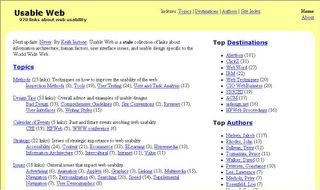 Usable Web Resources Usable Web - 970 Links About Web Usability http://usableweb.com/ Usable Web is a static collection of links about information architecture, human factors, user interface issues, and usable design specific to the World Wide Web. This has been added to World Wide Web Reference Subject Tracer™ Information Blog. posted by Marcus | 4:25 AM  Canadian Association of Research Libraries - Open Archives Metadata Harvester http://carl-abrc-oai.lib.sfu.ca/ Canadian Association of Research Libraries / Association des bibliothèques de recherche Open Archives Metadata Harvester. The Canadian Association of Research Libraries (CARL) Institutional Repositories Pilot Project Harvester. This Harvester is the search service for the CARL Institutional Repositories Pilot Project and aggregates material from each of the participating Canadian institutions, allowing users to seamlessly search all of the repositories at once, using one common point of access. The purpose of the Pilot Project is to increase the accessibility of Canadian scholarly material. Currently, Canadian research output is published and distributed in extremely diverse platforms and formats. As well, the majority of Canadian research output is published outside of Canada, with its institutional and national origins concealed. The CARL Institutional Repository Pilot Project aims to increase the visibility of Canadian researchers and universities through the implementation of repositories at a number of Canadian institutions. An institutional repository (IR) is a digital collection of a university’s intellectual output. It centralizes, preserves, and makes accessible the knowledge generated by an academic institution. Institutional repositories also form part of a larger global system of repositories, which are indexed in a standardized way and freely accessible to anyone with an Internet connection, providing the foundation for a new model of scholarly publishing. The CARL/ABRC OAI Harvester currently has 4509 records from 9 archives indexed, and is updated daily. This will be added to Academic and Scholar Search Engines and Sources annotated white paper link compilation. posted by Marcus | 4:20 AM  The Emerging Mind http://www.bbc.co.uk/radio4/reith2003/lectures.shtml The 2003 Reith Lectures from the BBC profiled Professor VS Ramachandaran, a noted neuroscientist and the Director of the Centre for Brain and Cognition at the University of California (San Diego). The Prof. talks about how the “activity of the 100 billion little wisps of protoplasm - the neurons in your brain - give rise to all the richness of our conscious experience, including the “redness” of red, the painfulness of pain or the exquisite flavour of Marmite or Vindaloo.” This has been added to Research Resources Subject Tracer™ Information Blog. [eLearningPost] posted by Marcus | 4:15 AM  GenderIT.org http://www.GenderIT.org/ GenderIT.org emerged from the Association for Progressive Communications Women's Networking Support Programme's advocacy work in information and communications technologies (ICTs). The need to have examples of national policy, gender-sensitive language, tools for lobbying, and an understanding of the impact of poor or positive policy all within easy access has been expressed by ICT advocates and policy makers alike. The APC WNSP also developed the Monitor for gender advocates - women's organisations and movements across the world who are just beginning to explore gender issues in the deployment and application of ICTs, and need to understand the intersections with key women's issues such as violence against women or economic empowerment. GenderIT.org is the result of months of researching, classifying, interpreting and monitoring ICT policies which affect women around the world, but specifically in four regions – Africa, Asia-Pacific, Central Eastern Europe and Latin America. The Monitor has three main objectives: a) To develop an information resource/knowledge sharing site for gender and ICT advocates, civil society organisations and policy makers that wish to be active in gender and ICT policy; b) To raise awareness among civil society organisations, specifically in women’s movements, regarding gender and ICT policy issues; c) To empower women’s organisations and networks in collaboration with other civil society actors to take action on ICT policy issues and develop ICT policy that meets their needs. To encourage them to lobby for an information society that builds social justice and human rights, at the national, regional and global level. This has been added to Reference Resources Subject Tracer™ Information Blog. posted by Marcus | 4:10 AM  RSS Digest http://www.bigbold.com/rssdigest/index.html RSS Digest: Show and syndicate RSS and news feed on your Web page with no programming. Place items and headlines from any RSS or Atom enabled site (such as del.icio.us or Flickr) onto your site, no programming required. It can use JavaScript, PHP, or an IFRAME as the inclusion method, so anyone can use it. Get no ugly ads, and use ANY valid feed! This has been added to my presentation Bots, Blogs and News Aggregators resource listing. posted by Marcus | 4:05 AM Aggregation Is the New Scale http://www.buzzmachine.com/archives/2005_04_12.html#009447 Scale doesn't scale anymore. The old days of big players in the economy collecting consumers, audience, distribution, manufacturing efficiency, buying power, or capital in the grip of centralized control are waning. That used to be the way to find efficiency and size. That used to be the way to scale. But they are being foiled by our new distributed world. And they are being replaced by a more efficient means of finding size and efficiency. Aggregation is the new scale. . . . News: As a producer, why depend on the 300 (expensive, snarky, recalcitrant) reporters you pay for when you could have 3,000 aggregated reporters to get more news less expensively than ever before. As a consumer, why depend on one or two sources of news a day when you can aggregate the best of 200? Media: As a distributor, when you can no longer use your stranglehold on channels to guarantee you an audience, you will have to aggregate audiences to reach scale. This will be added to my Bots, Blogs and News Aggregators presentation resources. [SPJ PressNotes for Tuesday, April 12, 2005] posted by Marcus | 4:00 AM Wednesday, April 20, 2005 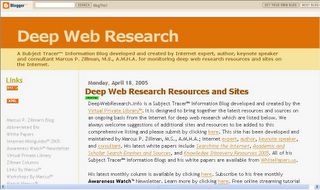 Deep Web Research Subject Tracer™ Information Blog Deep Web Research  http://www.DeepWebResearch.info/ I have completely updated and validated all the links for my Subject Tracer™ Information Blog: Deep Web Research. As always the bots will continue to update and if anyone knows of additional competent resources please email me so that I may include them. posted by Marcus | 4:30 AM  Spam and Phishing: Public Policy Report http://www.pewinternet.org/report_display.asp?r=155 Spam and Phishing: Email users get more spam, but the harmful impact of unsolicited messages is diminishing for them. More than a third of email users have gotten phishing solicitations. More than a year after the CAN-SPAM Act became law, email users say they are receiving slightly more spam in their inboxes than before, but they are minding it less. A survey by the Pew Internet & American Life Project conducted between January 13 and February 9, 2005, shows the following: a) 28% of users with a personal email account say they are getting more spam than a year ago, while 22% say they are getting less; b) 21% of users with a work email account say they are getting more spam than a year ago, while 16% say they are getting less; c) 53% of email users say spam has made them less trusting of email, compared to 62% a year ago; d) 22% of email users say that spam has reduced their overall use of email, compared to 29% a year ago; and e) 67% of email users say spam has made being online unpleasant or annoying, compared to 77% a year ago. Overall, more than half of all internet users (52%) complain that spam is a big problem. This has been added to the anti-fraud and anti-spam sections of Internet Hoaxes Subject Tracer™ Information Blog. posted by Marcus | 4:25 AM  Computers in Libraries 2005: Presentation Links http://www.infotoday.com/cil2005/presentations/ This page features links to World Wide Web sites, PowerPoint slideshows, and other electronic resources used in support of presentations at Computers in Libraries 2005. Links are provided at the discretion of presenters. Additional links will be provided as they become available. This has been added to Reference Resources Subject Tracer™ Information Blog. posted by Marcus | 4:20 AM  Linus Pauling Research Notebooks http://osulibrary.orst.edu/specialcollections/rnb/ As with many scientists, Linus Pauling utilized bound notebooks to keep track of the details of his research as it unfolded. A testament to the remarkable length and diversity of Dr. Pauling's career, the Pauling Papers holdings include forty-six research notebooks spanning the years of 1922 to 1994 and covering any number of the scientific fields in which Dr. Pauling involved himself. In this regard, the notebooks contain many of Pauling's laboratory calculations and experimental data, as well as scientific conclusions, ideas for further research and numerous autobiographical musings. This has been added to Research Resources Subject Tracer™ Information Blog. posted by Marcus | 4:15 AM  PhDweblogs http://phdweblogs.net/ PhDweblogs.net is a non-profit initiative to bring together PhD students' weblogs from all around the world. If you are preparing a PhD, and have a blog about your research interests, you can register it here. We also accept other research-related weblogs, even if they are not directly connected to a PhD. This has been added to Research Resources Subject Tracer™ Information Blog. posted by Marcus | 4:10 AM  Spyware Installation Methods http://www.benedelman.org/spyware/installations/ Spyware Installation Methods, by Benjamin Edelman, updated April 11, 2005. "This page indexes installation methods used by spyware programs and other unwanted software." [beSpacific April 11, 2005] posted by Marcus | 4:05 AM Tuesday, April 19, 2005 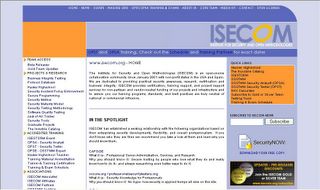 Institute for Security and Open Methodologies (ISECOM) Institute for Security and Open Methodologies (ISECOM) http://www.isecom.org/ The Institute for Security and Open Methodologies (ISECOM) is an open-source collaborative community since January 2001 with non-profit status in the USA and Spain. We are dedicated to providing practical security awareness, research, certification and business integrity. ISECOM provides certification, training support, and project support services for non-partisan and vendor-neutral funding of our projects and infrastructure and to assure you our training programs, standards, and best practices are truly neutral of national or commercial influence. This will be added to Security Resources 2005 Internet MiniGuide. posted by Marcus | 4:25 AM  Server.com - Easy To Use, Easy To Maintain Web-Based Applications http://server.com/ Launched in 1996, Server.com is one of the Internet's first and largest ASPs. They provide a suite of web-based applications for over 20,000 individuals and organizations delivering up to 4 million pageviews daily to over 100,000 users. They also host over 5,000 email newsletters with over 2.5 million subscribers. Past and present clients include US Robotics, Harvard University, the C++ Seminar, the Chicago Medical School, the Association of Illustrators, Habitat Magazine, the University of Edinburgh and the Las Vegas Tribune. The company's ongoing mission is to provide an array of WebApps which can be utilized by individuals, groups or businesses. Current web-based applications include: 1) DiscussionApp, 2) ListApp, 3) CalendarApp, 4) DBApp, and 5) NewsApp. This has been added to World Wide Web Reference Subject Tracer™ Information Blog. posted by Marcus | 4:20 AM  Lickr http://brevity.org/code/mozilla/greasemonkey/lickr/ Flickr is a popular photo hosting service that uses embedded Flash files as part of their interface. On every page, there will be a little delay while a new Flash file loads. Lickr removes the need for Flash. It runs within the web browser Firefox, stripping the Flash before the user can even see it, and replacing it with an equivalent interface in pure HTML and Javascript. Lickr combines Flickr, Greasemonkey, and Ajax, and is worth triple points in buzzword bingo. posted by Marcus | 4:15 AM  Power.org http://www.power.org/ Power.org represents a worldwide community of developers, tool providers, manufacturers, and leading brands uniting to lead a new era of open hardware innovation by collaborating on industry standards and delivering ground breaking applications based on Power Architecture™ technology. Join Power.org and get in on the evolution. This has been added to World Wide Web Reference Subject Tracer™ Information Blog. posted by Marcus | 4:10 AM  MedlinePlus: Videos of Surgical Procedures http://www.nlm.nih.gov/medlineplus/surgeryvideos.html This page provides links to pre-recorded webcasts of surgical procedures. These are actual operations performed at medical centers in the United States since January 2004. The videos last an hour. Please note that you cannot send in questions by email, though the webcast may say that you can, because you are not seeing these videos live. If you want to see live operations click here. You will need RealPlayer to view the programs. If you do not have Real Player, you will be prompted to obtain a free download of the software before you view the presentation. he videos open in a second window. If you have a pop-up blocker, you will need to disable it to view the programs. This will be added to Healthcare Resources 2005 Internet MiniGuide. posted by Marcus | 4:05 AM   Articles for Educators http://www.articlesforeducators.com/ Articles For Educators is a free resource offered by Virtu Software. On this website, teachers will find lesson plans, field trip ideas, tips and tricks for the classroom written by educators. Visitors can browse the directory of articles by subject or search for a specific topic. This section highlights Mathematics lesson plans written by math teachers and is organized into the following main sections: Competition, Fun with Numbers, and Miscellaneous. Membership, which is free, provides educators access to post articles, comment on other articles, or discuss subjects in the community forum. The website does include a few advertisements, but they do not overwhelm the website and its creator, a software developer who is also active in Christian ministry, also includes several Christian education links. This will be added to Education and Distance Learning Resources 2005 Internet MiniGuide.[From The NSDL Scout Report for Math, Engineering, and Technology, Copyright Internet Scout Project 1994-2005. http://scout.wisc.edu/] posted by Marcus | 4:00 AM Monday, April 18, 2005  Research Resources Subject Tracer Information Blog This mp3 broadcast edition of Current Awareness Happenings on the Internet by Marcus P. Zillman, M.S., A.M.H.A. April 18, 2005 V3N16 discusses Research Resources Subject Tracer Information Blog. Click on the below audio mp3 broadcast to hear Marcus P. Zillman describing this Subject Tracer that he created and maintains. View this site at: Research Resources Subject Tracer Information Blog http://www.ResearchResources.info/  posted by Marcus |
4:26 AM
posted by Marcus |
4:26 AM
 Consumer’s Tool Kit for Health Care Advance Planning http://www.abanet.org/aging/toolkit/ The Consumer’s Tool Kit for Health Care Advance Planning is made available from the American Bar Association's Commission on Law and Aging. If you are looking at this tool kit, you are either thinking of making a health care advance directive (such as a living will or durable power of attorney for health care), or you may have already signed one. In either case, you should be aware that just having a written advance directive by itself does not ensure that your wishes will be understood and respected. Studies have shown that standard advance directive forms do little to influence end-of-life decisions without: 1) informed, thoughtful reflection about your wishes and values, and 2) personal communication between you and your likely decision-makers before a crisis occurs. Good advance planning for health care decisions is, in reality, a continuing conversation - about values, priorities, the meaning of one's life, and quality of life. To help you in this process, this tool kit contains a variety of self-help worksheets, suggestions, and resources. There are 10 tools in all, each clearly labeled and user-friendly. The tool kit does not create a formal advance directive for you. Instead, it helps you do the much harder job of discovering, clarifying, and communicating what is important to you in the face of serious illness. This has been added Elder Resources Subject Tracer™ Information Blog. This will be added to Healthcare Resources 2005 Internet MiniGuide. This will be added to Legal Resources 2005 Internet MiniGuide. posted by Marcus | 4:25 AM 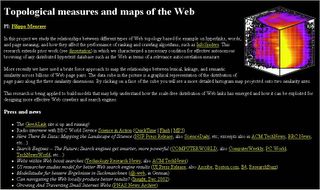 Topological Measures and Maps of the Web Topological Measures and Maps Of the Web http://informatics.indiana.edu/fil/Web/ In this project Filippo Menczer and his researchers study the relationships between different types of Web topology based for example on hyperlinks, words, and page meaning, and how they affect the performance of ranking and crawling algorithms, such as InfoSpiders. This research extends prior work in which they characterized a necessary condition for effective autonomous browsing of any distributed hypertext database such as the Web in terms of a relevance autocorrelation measure. More recently they have used a brute force approach to map the relationships between lexical, linkage, and semantic similarity across billions of Web page pairs. This research is being applied to build models that may help understand how the scale-free distribution of Web links has emerged and how it can be exploited for designing more effective Web crawlers and search engines. This has been added to the articles section of Deep Web Research Subject Tracer™ Information Blog. posted by Marcus | 4:15 AM  Bulletin of the World Health Organization http://www.who.int/bulletin/en/ The World Health Organization (WHO) is well-regarded for its numerous public health studies that span the globe and its extensive publication series, which includes working papers, reports, factsheets, and its _Bulletin of the World Health Organization_(BLT). From this webpage, visitors can peruse the current issue of the Bulletin, or browse the complete run of the Bulletin all the way back to the first issue, which was published in 1947. Persons looking for the Bulletin in other languages can peruse Volumes 77 through 80 in both Spanish and French. Some of the more compelling recent pieces include "Public health, emergencies, and the humanitarian impulse" and "Human resources for polio eradication". The site is rounded out by an area where visitors can also elect to sign up to receive a monthly email notification of the table of contents from the Bulletin. This has been added to Healthcare Resources 2005 Internet MiniGuide. [From The Scout Report, Copyright Internet Scout Project 1994-2005. http://scout.wisc.edu/] posted by Marcus | 4:10 AM 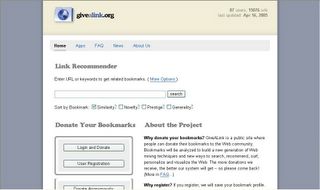 givealink.org - Link Recommender GiveALink http://givealink.org/ GiveALink is a public site where people can donate their bookmarks to the Web community. Bookmarks will be analyzed to build a new generation of Web mining techniques and new ways to search, recommend, surf, personalize and visualize the Web. The more donations they receive, the better their system will get -- so please come back! Filippo Menczer is their fearless leader. He is an associate professor of informatics and computer science at Indiana University, Bloomington and a keynote speaker at my BOT2001. This has been added to the tools section of Research Resources Subject Tracer™ Information Blog. posted by Marcus | 4:05 AM  SPIRAL: Selected Patient Information Resources in Asian http://spiral.tufts.edu/ SPIRAL: Selected Patient Information Resources in Asian Languages is a joint initiative of the South Cove Community Health Center and Tufts University Health Sciences Library is supported by a grant from the New England Region of the National Network of Libraries of Medicine under contract NLM-00-101/SMS. The project aims to: 1) increase electronic access to health information for consumers and health care providers of the South Cove Community Health Center and its affiliates by developing a web site to meet the information needs of the South Cove community; 2) provide consumer information in the languages of the community served, specifically Chinese, Cambodian, Vietnamese and Laotian; and 3) teach health care providers to use the wide variety of Internet resources available to them and their patients including National Library of Medicine and Tufts University resources. This has been added to Healthcare Resources 2005 Internet MiniGuides. posted by Marcus | 4:00 AM Sunday, April 17, 2005  Earth Day - April 22, 2005 1) Wisconsin Historical Society: Turning Points--An Overview of Earth Day, 1970 http://www.wisconsinhistory.org/turningpoints/search.asp?id=1140 2) Wisconsin Historical Society: Turning Points-An Environmental Agenda for the 70's http://www.wisconsinhistory.org/turningpoints/search.asp?id=1139 3) U.S. Environmental Protection Agency: Earth Day '70 http://www.epa.gov/history/topics/earthday/02.htm 4) U.S. Environmental Protection Agency: Earth Day Recollections http://www.epa.gov/history/topics/earthday/10.htm 5) Earth Day Network http://www.earthday.net/ 6) EarthDay.gov: Take Action In Your Classroom http://www.earthday.gov/classroom.htm 7) Army Earth Day http://aec.army.mil/usaec/publicaffairs/earthday00.html 8) The Wilderness Society: Earth Day http://earthday.wilderness.org/ On April 22, 2005, people around the world will celebrate the 35th anniversary of Earth Day. This Topic in Depth focuses on the past and present of this significant day. From the Wisconsin Historical Society, the first two sites contain historical documents pertaining to Earth Day. The first (1) document features a May 1970 issue of The Gaylord Nelson Newsletter reporting on the first Earth Day. The second (2) document is a speech by Nelson entitled "An Environmental Agenda for the 70's." Housed in the archives of the US Environmental Protection Agency (EPA) website, the next two sites also contain historical documents. The first (3) site contains an article written by Nelson for the EPA Journal in April of 1980, entitled "Earth Day '70: What It Meant." The second (4) site contains an article written by John C. Whitaker (former Interior undersecretary in the Nixon administration) for the EPA Journal in the summer of 1998. The article is entitled "Earth Day Recollections: What It Was Like When the Movement Took Off." The (5) Earth Day Network (first mentioned in the April 4, 2003, Scout Report for Life Sciences) works "to broaden the environmental movement worldwide and to educate and mobilize people, governments, and corporations to take responsibility for a clean and healthy environment." In addition to information sections about Ongoing Programs, Current Campaigns, and News, the Earth Day Network website contains Earth Day 2005 Materials for organizers. From EarthDay.gov, Take Action In Your Classroom (6) offers links to a variety of environmental education resources. The next website, from the U.S. Army Environmental Center, presents (7) Army Earth Day; and links to information about the Army's environmental activities. The final (8) site is an Earth Day-inspired educational website (first reported on in the April 14, 1999 Scout Report for Science & Engineering) from the Wilderness Society. The site offers a collection of environmental education resources for teachers and students. [From The NSDL Scout Report for the Life Sciences, Copyright Internet Scout Project 1994-2005. http://scout.wisc.edu/] posted by Marcus | 4:25 AM  Work Bloggers Offered Guidelines http://news.bbc.co.uk/2/hi/technology/4423809.stm Bloggers, people who have their own websites where they share thoughts daily, have been urged to be anonymous if they write about their workplace. The advice comes from the Electronic Frontier Foundation (EFF), a US digital civil rights group, which has issued guidelines for safe blogging. posted by Marcus | 4:20 AM  PD Photo - Public Domain Photos PDPhoto.org - Royalty Free Public Domain Stock Photos http://pdphoto.org/ PDPhoto.org is a repository for public domain photos. Use the photos for anything, including commercial uses, other websites, school projects, articles, ads, whatever. Public domain means the photo is not protected by copyright and may be freely used by everyone. Unless something is clearly marked as being something other than public domain, you can assume it is free to use. This has been added to Reference Resources Subject Tracer™ Information Blog. posted by Marcus | 4:15 AM  GridSim: A Grid Simulation Toolkit for Resource Modelling and Application Scheduling for Parallel and Distributed Computing http://www.gridbus.org/gridsim/ Peer-to-Peer/Grid computing has emerged as a potential next generation platform for solving large-scale problems in science, engineering, and commerce. It is expected to involve millions of (heterogenous) resources scattering across multiple organizations, administrative domains, and policies. The management and scheduling of resources in such a large-scale distributed systems is complex and therefore, demands sophisticated tools for analysing and fine-tuning the algorithms before applying them to the real systems. Simulation appears to be the only feasible way to analyse algorithms on large-scale distributed systems of heterogenous resources. Unlike using the real system in real time, simulation works well, without making the analysis mechanism unnecessary complex, by avoiding the overhead of co-ordination of real resources. Simulation is also effective in working with very large hypothetical problems that would otherwise require involvement of a large number of active users and resources, which is very hard to coordinate and build at large-scale research environment for investigation purpose. The primary objective of this project is to investigate effective resource allocation techniques based on computational economy through simulation. They like to simulate millions of resources and thousands of users with varied requirements and study scalability of systems, algorithms, efficiency of resource allocation policies and satisfaction of users. They are also interested to explore how significantly the local economy and the global positioning (e.g., the time zone) of a particular resource play role in securing jobs under various pricing and demand/supply situations. This has been added to Grid Resources Subject Tracer™ Informatiuon Blog. posted by Marcus | 4:10 AM  TCscreen Screen Capture and Video Utility http://www.talkingcommunities.com/tcscreen/ Making videos of your screen and publishing them on the web has never been easier. TCscreen allows you to capture all movements, actions, and images as well as sound from your microphone directly into a video and publish it immediately on the Internet. All in just two easy steps. Built-in templates allows you to publish the video how you want, and you can easily modify these templates to add your own personal touch. In addition, a unique whiteboard tool allows you to draw right on your screen, making it possible to highlight and point during your video. This has been added to the tools section of Research Resources Subject Tracer™ Information Blog. posted by Marcus | 4:05 AM  EFF: Anonymity/Pseudonymity http://www.eff.org/Privacy/Anonymity/ Many people don't want the things they say online to be connected with their offline identities. They may be concerned about political or economic retribution, harassment, or even threats to their lives. Whistleblowers report news that companies and governments would prefer to suppress; human rights workers struggle against repressive governments; parents try to create a safe way for children to explore; victims of domestic violence attempt to rebuild their lives where abusers cannot follow. Instead of using their true names to communicate, these people choose to speak using pseudonyms (assumed names) or anonymously (no name at all). For these individuals and the organizations that support them, secure anonymity is critical. It may literally save lives. Anonymous communications have an important place in our political and social discourse. The Supreme Court has ruled repeatedly that the right to anonymous free speech is protected by the First Amendment. This has been added to Privacy Resources Subject Tracer™ Information Blog. posted by Marcus | 4:00 AM Saturday, April 16, 2005 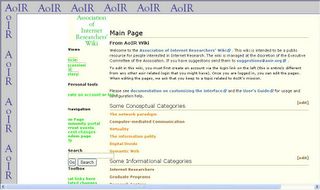 AoIR Wiki Association of Internet Researchers' Wiki http://wiki.aoir.org/index.php?title=Main_Page Association of Internet Researchers'Wiki. This wiki is intended to be a public resource for people interested in Internet Research. The wiki is managed at the discretion of the Executive Committee of the Association. Some categories include: Internet Researchers, Research Centers, Research Method, Research Ethics, Links to Online Papers, and Links to Books. This has been added to Research Resources Suvject Tracer™ Information Blog. posted by Marcus | 4:25 AM Last Call: XQuery, XPath and XSLT http://www.w3.org/XML/ The XML Query Working Group and the XSL Working Group released twelve Working Drafts for the XQuery, XPath and XSLT languages. Seven are in last call through 13 May. Important for databases, search engines and object repositories, XML Query can perform searches, queries and joins over collections of documents. XSLT transforms documents into different markup or formats. Both XQuery and XSLT 2 use XPath expressions and operate on XPath Data Model instances. XML Query Use Cases: The motivations of XML Query explained in examples http://www.w3.org/TR/2005/WD-xquery-use-cases-20050404/ XML Path Language (XPath) 2.0: Expression syntax for referring to parts of XML documents - Last Call http://www.w3.org/TR/2005/WD-xpath20-20050404/ XQuery 1.0 and XPath 2.0 Data Model: For both XML and non-XML sources - Last Call http://www.w3.org/TR/2005/WD-xpath-datamodel-20050404/ XQuery 1.0 and XPath 2.0 Functions and Operators: The functions you can call in XPath expressions and the operations you can perform on XPath data types - Last Call http://www.w3.org/TR/2005/WD-xpath-functions-20050404/ XSLT 2.0 and XQuery 1.0 Serialization: Defines how to output the results of XSLT 2.0 and XML Query evaluation in XML, HTML or as text - Last Call http://www.w3.org/TR/2005/WD-xslt-xquery-serialization-20050404/ XSL Transformations (XSLT) Version 2.0: Using XML schemas, transforms data model instances (XML and non-XML) into other documents including into XSL-FO for printing - Last Call http://www.w3.org/TR/2005/WD-xslt20-20050404/ XQuery 1.0: An XML Query Language: A non-XML, Perl-like syntax for querying collections of structured and semi-structured data both locally and over the Web - Last Call http://www.w3.org/TR/2005/WD-xquery-20050404/ XML Syntax for XQuery 1.0 (XQueryX): A precise representation in XML of the XML Query language, suitable for machine processing and introspection - Last Call http://www.w3.org/TR/2005/WD-xqueryx-20050404/ XQuery 1.0 and XPath 2.0 Full-Text Use Cases: Examples for full-text search over data model collections http://www.w3.org/TR/2005/WD-xmlquery-full-text-use-cases-20050404/ XQuery 1.0 and XPath 2.0 Full-Text: A full-text retrieval facility for XPath, XSLT and XML Query http://www.w3.org/TR/2005/WD-xquery-full-text-20050404/ XQuery 1.0 and XPath 2.0 Formal Semantics: The type system used in XQuery and XSLT 2 via XPath defined precisely for implementers http://www.w3.org/TR/2005/WD-xquery-semantics-20050404/ Building a Tokenizer for XPath or XQuery: Strategies for writing an XPath parser http://www.w3.org/TR/2005/WD-xquery-xpath-parsing-20050404/ posted by Marcus | 4:20 AM  How to Blog Safely (About Work or Anything Else) http://www.eff.org/Privacy/Anonymity/blog-anonymously.php Blogs are like personal telephone calls crossed with newspapers. They're the perfect tool for sharing your favorite chocolate mousse recipe with friends--or for upholding the basic tenets of democracy by letting the public know that a corrupt government official has been paying off your boss. If you blog, there are no guarantees you'll attract a readership of thousands. But at least a few readers will find your blog, and they may be the people you'd least want or expect. These include potential or current employers, coworkers, and professional colleagues; your neighbors; your spouse or partner; your family; and anyone else curious enough to type your name, email address or screen name into Google or Feedster and click a few links. The point is that anyone can eventually find your blog if your real identity is tied to it in some way. And there may be consequences. Family members may be shocked or upset when they read your uncensored thoughts. A potential boss may think twice about hiring you. But these concerns shouldn't stop you from writing. Instead, they should inspire you to keep your blog private, or accessible only to certain trusted people. Here we offer a few simple precautions to help you maintain control of your personal privacy so that you can express yourself without facing unjust retaliation. If followed correctly, these protections can save you from embarrassment or just plain weirdness in front of your friends and coworkers. This has been added to Privacy Resources Subject Tracer™ Information Blog. posted by Marcus | 4:15 AM  MIT Media Lab: Software Agents http://agents.media.mit.edu/index.html The Software Agents Group of the MIT Media Laboratory "investigates computer systems to which one can delegate tasks." Software agents are different from conventional software because they are "long-lived, semi-autonomous, proactive, and adaptive." Software Agents Group focuses on creating software that "acts as an assistant to the user rather than a tool, learning from interaction and proactively anticipating the user's needs." The website describes the group's various projects that use "common sense reasoning" to Enable the Semantic Web, to improve video came design, or to Find Cultural Differences in Text. Many of the descriptions include screenshots or video footage demonstrating the group's work, along with related publications. Various conference papers and journal article are also posted in the Publications section of the website. The resources section provides links to websites describing the Open Mind and ConceptNet projects, which form the foundation of the group's work. This has been added to Bot Research Subject Tracer™ Information Blog. [From The Scout Report, Copyright Internet Scout Project 1994-2005. http://scout.wisc.edu/] posted by Marcus | 4:10 AM  Hospital Compare - A Quality Tool for Adults, Including People With Medicare http://www.hospitalcompare.hhs.gov/ This tool provides you with information on how well the hospitals in your area care for all their adult patients with certain medical conditions. This information will help you compare the quality of care hospitals provide. Hospital Compare was created through the efforts of the Centers for Medicare and Medicaid Services (CMS) and organizations that represent hospitals, doctors, employers, accrediting organizations, other Federal agencies and the public. Talk to your doctor about this information to help you, your family and your friends make your best hospital care decisions. This has been added to Healthcare Resources Subject Tracer™ Information Blog. This will be added to Healthcare Ressources 2005 Internet MiniGuide. posted by Marcus | 4:05 AM  The Center for Public Integrity http://www.publicintegrity.org/ The Center for Public Integrity is a nonprofit, nonpartisan, tax-exempt organization that conducts investigative research and reporting on public policy issues in the United States and around the world. The Center was founded in 1989 by Charles Lewis following a successful 11-year career in network television news. Through thorough, thoughtful and objective analyses, the Center hopes to serve as an honest broker of information – and to inspire a better-informed citizenry to demand a higher level of accountability from its government and elected leaders. The Center extends its public policy journalism around the world. Created in 1997, the International Consortium of Investigative Journalist network includes 92 leading investigative reporters and editors in 48 countries. The group has collaborated on numerous online and printed reports on corporate crime, arms trafficking, terrorism, U.S. military policy and human rights issues. Global Access, another international project, was launched in 2001 to systematically track and report on openness, accountability and the rule of law in various countries. This has been added to Reference Resources Subject Tracer™ Information Blog. posted by Marcus | 4:00 AM Friday, April 15, 2005 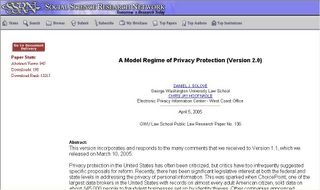 A Model Regime of Privacy Protection (Version 2.0) A Model Regime of Privacy Protection by Daniel J. Solove and Chris Jay Hoofnagle GWU Law School Public Law Research Paper No. 136 http://papers.ssrn.com/sol3/papers.cfm?abstract_id=699701 Partial Abstract: This version 2.0 incorporates and responds to the many comments that we received to Version 1.1, which we released on March 10, 2005. Privacy protection in the United States has often been criticized, but critics have too infrequently suggested specific proposals for reform. Recently, there has been significant legislative interest at both the federal and state levels in addressing the privacy of personal information. This was sparked when ChoicePoint, one of the largest data brokers in the United States with records on almost every adult American citizen, sold data on about 145,000 people to fraudulent businesses set up by identity thieves. Other companies announced security breaches, including LexisNexis, from which personal information about 32,000 people was improperly accessed. Senator Schumer criticized Westlaw for making available to certain subscribers personal information including Social Security Numbers (SSNs). In the aftermath of the ChoicePoint debacle and other major information security breaches, both of us have been asked by Congressional legislative staffers, state legislative policymakers, journalists, academics, and others about what specifically should be done to better regulate information privacy. In response to these questions, we believe that it is imperative to have a discussion of concrete legislative solutions to privacy problems. What appears below is our attempt at such an endeavor. Privacy experts have long suggested that information collection be consistent with Fair Information Practices. This Model Regime incorporates many of those practices and applies them specifically to the context of commercial data brokers such as ChoicePoint. We hope that this will provide useful guidance to legislators and policymakers in crafting laws and regulations. We also intend this to be a work-in-progress in which we collaborate with others. This has been added to Privacy Resources Subject Tracer™ Information Blog. posted by Marcus | 4:25 AM  HTML Indexer http://www.html-indexer.com/ HTML Indexer is the professional's tool for creating and maintaining real indexes for web sites, intranets, HTML Help, JavaHelp, and other HTML documents. Version 4 adds fully integrated cross-references, target frames and windows, framed output, multiple-file output, expanded undo-redo memory, "one-step accept" for default entries, even greater stylistic control, and more. This has been added to the tools section of Research Resources Subject Tracer™ Information Blog. posted by Marcus | 4:20 AM  Project Gutenberg http://www.gutenberg.org/ Project Gutenberg is the oldest producer of free electronic books (eBooks or etexts) on the Internet. Our collection of more than 15,000 eBooks was produced by hundreds of volunteers. Most of the Project Gutenberg eBooks are older literary works that are in the public domain in the United States. All may be freely downloaded and read, and redistributed for non-commercial use (for complete details, see the license page). Project Gutenberg is the first and largest single collection of free electronic books, or eBooks. Michael Hart, founder of Project Gutenberg, invented eBooks in 1971 and continues to inspire the creation of eBooks and related technologies today. This has been added to Reference Resources Subject Tracer™ Information Blog. posted by Marcus | 4:15 AM 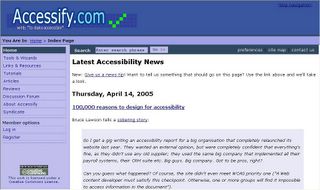 Accessify.com Accessify.com - Website Accessibility http://www.accessify.com/default.asp Accessify.com - all the tools, links and resources you'll ever need to make your web site accessible. Have you ever had discussions with people and said, "We need to make that accessible?" or "This site needs to to made 508 compatible"? All gets to be a bit of a mouthful, doesn't it? What is really needed to make these meetings much shorter is a new verb: 'accessify' - to make accessible. They like the phrase, so much that they built this site around it! What are the aims of Accessify? To build up a collection of useful resources, links to the best accessibility sites and an online toolset for everyone to use free of charge. This has been added to World Wide Web Reference Subject Tracer™ Information Blog. posted by Marcus | 4:10 AM  Where To Find Great Free Photographs And Visuals For Your Own Online Articles http://www.masternewmedia.org/news/2005/04/01/where_to_find_great_free.htm Finding quality images and photos for complementing an important article, essay or news report is already quite a challenge for many. Imagine when the goal is not just too find good images, but find some that you could openly and freely use without needing to pay royalties or one-time publishing rights to someone. This annotated listing with screenshots by Robin Good does an excellent job of giving you the resources to make your next article/publication shine brightly in cyberspace! This has been added to Reference Resources Subject Tracer™ Information Blog. posted by Marcus | 4:05 AM  Telework Exchange http://www.teleworkexchange.org/ The Telework ExchangeSM is a new public-private partnership focused on eliminating telework gridlock. The Telework Exchange offers an online community focused on demonstrating the tangible value of Federal telework initiatives, serving the emerging education and communications requirements of the Federal teleworker community, and measuring Federal agencies’ progress on telework requirements. The Telework Exchange community will feature a series of capabilities, including: 1) Telework value calculators that tally Federal telework potential cost saving and environmental dividends as well as provide a mechanism to gauge Federal agencies’ relative telework performance; 2) The Water Cooler: A collaboration and discussion platform designed to empower Federal personnel to discuss issues and share best practices; 3) Resource Center: A repository of useful tools, including a hosting platform for educational sessions; and 4) The Teleworker: A news resource reporting exclusively on Federal telework. This has been added to Employment Resources Subject Tracer™ Information Blog. posted by Marcus | 4:00 AM Thursday, April 14, 2005 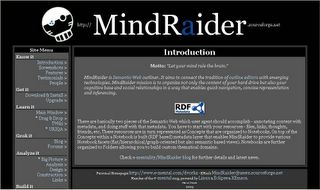 MindRaider - Semantic Web Outliner MindRaider - Semantic Web Outliner http://mindraider.sourceforge.net/ MindRaider is Semantic Web outliner. It aims to connect the tradition of outline editors with emerging technologies. MindRaider mission is to organize not only the content of your hard drive but also your cognitive base and social relationships in a way that enables quick navigation, concise representation and inferencing. There are basically two pieces of the Semantic Web which user agent should accomplish - annotating content with metadata, and doing stuff with that metadata. You have to start with your resources - files, links, thoughts, friends, etc. These resources are in turn represented as Concepts that are organized to Notebooks. On top of the Concepts within a Notebook is built (RDF based) metadata layer that enables MindRaider to provide various Notebook facets (flat/hierarchical/graph-oriented but also semantic based views). Notebooks are further organized to Folders allowing you to build custom thematical domains. This has been added to the tools section of Research Resources Subject Tracer™ Information Blog. This has been added to the semantic web research section of Deep Web Research Subject Tracer™ Information Blog. posted by Marcus | 4:25 AM Clinical Medicine and Health Research Netprints http://clinmed.netprints.org/home.dtl A repository of non-peer reviewed original research. Articles posted on this site have not yet been accepted for publication by a peer reviewed journal. They are presented here mainly for the benefit of fellow researchers. Casual readers should not act on their findings, and journalists should be wary of reporting them. This has been added to Research Resources Subject Tracer™ Information Blog. This has been added to Academic and Scholar Search Engines and Sources Annotated White Paper. This will be added to Healthcare Resources 2005 Internet MiniGuide. posted by Marcus | 4:20 AM 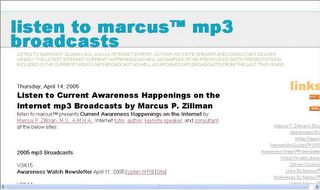 Listen To Marcus Listen To Marcus - Podcast and MP3 Broadcast http://www.ListentToMarcus.com/ Listen To Marcus Podcast and MP3 Broadcast starts its third year with three years of weekly archives of Current Awareness Happenings On the Internet. The actual MP3 broadcast started in May 2003 with a weekly Monday MP3 broadcast of current happenings on the Internet. Just in the last months have MP3/Podcasting taken off to millions upon millions of Internet listeners all over the world!! Listen weekly to what will be next!!! posted by Marcus | 4:15 AM Global Voices Online http://cyber.law.harvard.edu/globalvoices/ Global Voices is an international effort to diversify the conversation taking place online by involving speakers from around the world, and developing tools, institutions and relationships to help make these voices heard. The world is talking. Are you ready to listen? This will be added to my presentation Bots, Blogs and News Aggregators. posted by Marcus | 4:10 AM  Goliath: Company Profiles, News, Business Reference Information, Lead Generation, Business Contacts http://goliath.ecnext.com/ Goliath connects you to a wealth of business information, including business and industry news and detailed profiles of public and private companies worldwide. Goliath's content is logically organized and linked to maximize your search experience -- targeted search modules help you research competitors, create lead lists, find partners and suppliers, or research your industry. Goliath's information base is constantly growing, with new business content and news articles added daily, and Goliath's features and functionality are evolving based on changing market needs. Goliath is available on a pay-per-view basis or by subscription. If you have an ongoing need for business information, you can subscribe to Goliath as a whole, or choose a stand-alone subscription to the Industry and Business News or Competitive Intelligence module. This has been added to Business Intelligence Resources Subject Tracer™ Information Blog. This will be added to Business Resources 2005 Internet MiniGuide. posted by Marcus | 4:05 AM  Gnowsis - Semantic Desktop Environment http://www.gnowsis.org/ Gnowsis realizes a Semantic Desktop environment and is published by the Knowledge Management Lab of the DFKI. It can be used in research projects or by interested individuals. The Gnowsis system adds Semantic Web interfaces to common desktop applications. It enables users to use desktop computers like a small personal semantic web. Linking documents across applications and browsing through the personal information space is now possible. Emails, documents, addresses, photos, appointments that have been spread in the local data jungle can be linked conveniently, weaving a personal semantic web. Data structures are not changed and existing applications are extended and not replaced. Programmers can build Semantic Web and knowledge management applications on top of Gnowsis. Structured data from common desktop applications (like MS-Outlook) can be accessed in a simple web protocol, allowing developers and researchers to leverage this information. At the moment, Gnowsis is realised as a Java application. It is published as open source tool. The system is in a beta stadium and will be developed further, to be a basis for future research and commercial applications. This has been added to the tools section of Research Resources Subject Tracer™ Information Blog. posted by Marcus | 4:00 AM Wednesday, April 13, 2005 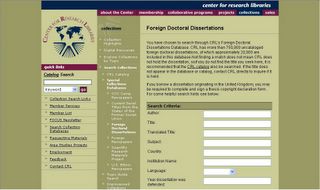 Foreign Doctoral Dissertations Foreign Doctoral Dissertations from the Center for Research Libraries (CRL) http://www.crl.edu/content.asp?l1=5&l2=23&l3=44&l4=25 Search through CRL's Foreign Doctoral Dissertations Database. CRL has more than 750,000 uncataloged foreign doctoral dissertations, of which approximately 20,000 are included in this database. Not finding a match does not mean CRL does not hold the dissertation, so if you do not find the title you seek here, it is recommended that the CRL catalog also be searched. If the title does not appear in the database or catalog, contact CRL directly to inquire if it is held. This will be added to Academic and Scholar Search Engines Sources Annotated White Paper and to Academic Resources 2005 Internet MiniGuide. posted by Marcus | 4:25 AM Yagoohoogle - Side by Side Comparison of Search Results from Google and Yahoo http://www.yagoohoogle.com/ The UK Inquirer reports on a site called Yagoohoogle that provides side by side search results using two window panes for Google and Yahoo respectively, allowing users an interesting, albeit compressed perspective on the "big two" search engine. This has been added to the search engine section of all the 2005 Internet MiniGuides.[beSpacific April 5, 2005] posted by Marcus | 4:20 AM The Internet Governance Project (IGP) http://www.internetgovernance.org/ The Internet Governance Project (IGP) is an interdisciplinary consortium of academics with scholarly and practical expertise in international governance, Internet policy, and information and communication technology. The Project is conducting research on and publishing analysis of Internet governance. Some of the work is intended to contribute to the World Summit on the Information Society (WSIS), and the United Nations Working Group on Internet Governance, as well as related debates at the international, regional and national levels. This has been added to Reference Resources Subject Tracer™ Information Blog. posted by Marcus | 4:15 AM Internet Encyclopedia of Ukraine (IEU) http://encyclopediaofukraine.com/ This site is under construction. Once completed, the Internet Encyclopedia of Ukraine (IEU) will be the most comprehensive source of information in English on Ukraine, its history, people, geography, society, economy, and cultural heritage. At present, the IEU team is working on phase 1 of the project: the creation of an Internet database containing the revised and updated contents of the five-volume Encyclopedia of Ukraine (University of Toronto Press, 1984-93) edited by Volodymyr Kubijovyc (vols. 1-2) and Danylo Husar Struk (vols. 3-5). Less than eight percent of this information is currently displayed on their site. New entries are being edited, updated, and added daily. Their ability to update this information and the speed with which they can make it available to Internet users worldwide will greatly depend on the availability of financial resources for their project. You can greatly contribute to the success of the Internet Encyclopedia of Ukraine by supporting their work morally and financially. This has been added to Reference Resources Subject Tracer™ Information Blog. posted by Marcus | 4:10 AM How To Conduct a Background Check (Part 2) http://www.virtualchase.com/articles/background_checks_part2.html Part two of the Virtual Chase's article, How To Conduct a Background Check, is now available. The fictional Lawyer X walks an associate through the process of investigating a business person's background. The article includes links to many unusual, or uncommon, sources of public records information. This has been added to Finding People Subject Tracer™ Information Blog. posted by Marcus | 4:05 AM Kids Search Engines http://searchenginewatch.com/links/article.php/2156191 The services listed at this site written by Danny Sullivan are designed primarily to serve the needs of children, either in focus, or by filtering out sites that some parents and teachers might find inappropriate for kids. These usually include sites that deal with explicit sexual matters, porn sites, violence, hate speech, gambling and drug use. This will be added to Reference Resources Subject Tracer™ Information Blog. This will be added to the search engine section of 2005 Internet MiniGuides. posted by Marcus | 4:00 AM Tuesday, April 12, 2005 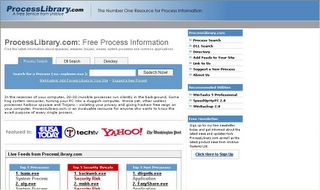 ProcessLibrary ProcessLibrary.com: Free Process Information http://www.processlibrary.com/ Find the latest information about spywares, adwares, trojans, viruses, system processes and common applications. In the recesses of your computer, 20-30 invisible processes run silently in the background. Some hog system resources, turning your PC into a sluggish computer. Worse yet, other useless processes harbour spyware and Trojans - violating your privacy and giving hackers free reign on your computer. ProcessLibrary.com is an invaluable resource for anyone who wants to know the exact purpose of every single process. This has been added to Internet Experts Subject Tracer™ Information Blog. posted by Marcus | 4:25 AM KnowleSys - Web Data Extraction http://www.knowlesys.com WebEx extraction service extract these contents: URLs, titles, field texts of various databases, E-mail addresses, numerals, dates, as well as various kinds of pictures, document files, sound files and multimedia files etc., then to put them into your own database and file system. This has been added to Data Mining Resources Subject Tracer™ Information Blog. This has been added to Knowledge Discovery Subject Tracer™ Information Blog. This has been added to Web Data Extractors White paper Link Compilation. posted by Marcus | 4:20 AM Mineral Commodity Summaries http://minerals.usgs.gov/minerals/pubs/mcs/ Published on an annual basis, this report is the earliest Government publication to furnish estimates covering nonfuel mineral industry data. Data sheets contain information on the domestic industry structure, Government programs, tariffs, and 5-year salient statistics for over 90 individual minerals and materials. This has been added to Reference Resources Subject Tracer™ Information Blog. posted by Marcus | 4:15 AM Economic Policy Institute (EPI) JobWatch http://jobwatch.org/ EPI’s JobWatch web feature tracks current trends in the U.S. labor market and offers up-to-date readings on its status. Areas covered include: 1) One component of JobWatch tracks job growth and measures it against the number of jobs the Bush Administration said would be created when their 2003 tax cut proposal was passed by Congress. Specifically, the Bush Administration has claimed that when the cuts went into effect the economy would create 5.5 million jobs from July 2003 through the end of 2004; 2) State-by-state job trends are updated mid-month as new data are available; and 3) National Jobs and Wages is a special section devoted to presenting and explaining the essential trends in the current labor market. This has been added to Employment Resources Subject Tracer™ Information Blog. posted by Marcus | 4:10 AM Grading the States 2005 - Government Performance Project http://results.gpponline.org/ The Government Performance Project (GPP) is the nation’s only source for comprehensive and independent information about state management performance. Their mission is to give state governments information they can use to improve management and achieve their goals. Categories covered in the ratings and in detail include: 1) Money, 2) People, 3) Infrastructure and 4) Information. The GPP is sponsored by a grant from The Pew Charitable Trusts. This has been added to Research Resources Subject Tracer™ Information Blog. posted by Marcus | 4:05 AM arXiv.org e-Print Archive http://www.arxiv.org/ arXiv is an e-print service in the fields of physics, mathematics, non-linear science, computer science, and quantitative biology. The contents of arXiv conform to Cornell University academic standards. arXiv is owned, operated and funded by Cornell University, a private not-for-profit educational institution. arXiv is also partially funded by the National Science Foundation. This has been added to Research Resources Subject Tracer™ Information Blog. This will be added to Academic Resources 2005 Internet MiniGuide. posted by Marcus | 4:00 AM Monday, April 11, 2005 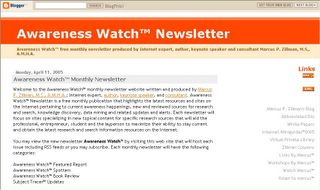 Awareness Watch Newsletter This mp3 broadcast edition of Current Awareness Happenings on the Internet by Marcus P. Zillman, M.S., A.M.H.A. April 11, 2005 V3N15 discusses Awareness Watch Newsletter. Click on the below audio mp3 broadcast to hear Marcus P. Zillman describing this newsletter that he has authored for the last three years. View this site at: Awareness Watch Newsletter http://www.AwarenessWatch.com/  posted by Marcus |
7:53 AM
posted by Marcus |
7:53 AM
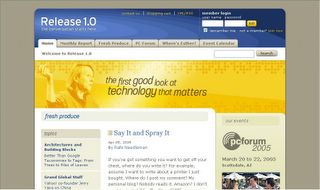 Release 1.0 Release 1.0 http://www.release1-0.com/ Release 1.0 is a business unit of CNET Networks. Until its acquistion by CNET in March 2004, the company was known as EDventure Holdings and was owned and managed by Esther Dyson and Daphne Kis. It publishes the influential monthly technology business report, Release 1.0, sponsors PC (Platforms for Communication) Forum, the industry's premier executive gathering, and publishes the website. It is further involved in a variety of industry initiatives and activities. The Release 1.0 monthly report, a subscription-based publication, is edited by Esther and covers the worlds of information technology and the Internet, including wireless communications, security, business models, online services, tracking systems, identity management and other unpredictable topics...and the policy issues they raise. It is widely quoted and known for its witty commentary and early insight into industry trends. This will be added to eCurrent Awareness Rsources 2005 Business Intelligence Report. posted by Marcus | 4:25 AM Remote Approach http://www.remoteapproach.com/ Remote Approach helps companies and individuals who publish and distribute Adobe® Acrobat(PDF) documents to understand the reach and use of their materials. They offer a suite of tools and services to help clients identify, manage and measure their document use in real-time. This has been added to eCurrent Awareness Resources 2005 Business Intelligence Report. posted by Marcus | 4:20 AM Changing Research Practices in the Digital Information and Communication Environment By John W. Houghton With Colin Steele and Margaret Henty http://eprints.anu.edu.au/archive/00002196/01/c_res_pract.pdf Executive Summary: In the context of the emerging knowledge-based economy, innovation and the capacity of the national innovation system to create and disseminate scientific and scholarly information are increasingly fundamental determinants of national prosperity. In their foundational work on National Innovation Systems, the OECD observed that prosperity in a knowledge economy depends as much, if not more, on the knowledge distribution power of the system than it does on its knowledge production power (OECD 1997, p43). This makes the infrastructure supporting research communication and collaboration, information search and access, and dissemination and publication a key element of the national innovation system. It is essential, therefore, to provide cost-effective access to, and dissemination of scientific and scholarly information in support of research and its economic, social and environmental applications. This study examines evolving research practices, focusing on how practices are changing and what the implications of those changes are for scholarly communication and the future development of the research infrastructure. It outlines a coherent agenda for the evolutionary development of a sustainable research information and scholarly communication infrastructure.[David Dillard April 4, 2005 Net-Gold] posted by Marcus | 4:15 AM Shared Web Annotations As A Platform for Third-Party Value-Added Information Providers: Architecture, Protocols, and Usage Examples by Martin Röscheisen, Christian Mogensen, and Terry Winograd. http://www-diglib.stanford.edu/diglib/pub/reports/commentor.html Abstract: In this paper, we present an architecture, called "ComMentor", which provides a platform for third-party providers of lightweight super-structures to material provided by conventional content providers. It enables people to share structured in-place annotations about arbitrary on-line documents. The system is part of a general "virtual document" architecture ("PCD BRIO") in which--with the help of lightweight distributed meta information--documents are dynamically synthesized from distributed sources depending on the user context and the meta-information which has been attached to them. The meta-information is managed independently of the documents themselves on separate meta-information servers, both in terms of storage and authority. A wide range of useful scenarios can be readily realized on this platform. We give examples of how a more personalized content presentation can be achieved by leveraging the database storage of the uniform meta-information and generating documents dynamically for a particular user perspective. These include structured discussion about paper drafts, collaborative filtering, seals of approval, tours, shared "hotlists" with section-based visibility control, usage indicators, co-presence, and value-added trails. Our object model and request interface for the prototype implementation are defined in technical detail in the appendix. This has been added to Research Resources Subject Tracer™ Information Blog. posted by Marcus | 4:10 AM Media Trade Monitor http://www.mediatrademonitor.org/ Media Trade Monitor is a resource pool for information about the impact of global, regional, and bilateral trade agreements on media, culture, and communication. It is meant to help place media, culture, and communication squarely on the agenda of the global justice movement, and to help activists and progressive policymakers successfully fight to keep these sectors out of so-called ‘free trade’ deals, be they global (WTO), regional (FTAA, CAFTA), or bilateral. This will be added to International Trade Resources 2005 Internet MiniGuide. posted by Marcus | 4:05 AM Podcasting Catches On http://www.pewinternet.org/PPF/r/154/report_display.asp According to the latest Pew Internet memo, more than 22 million American adults own iPods or MP3 players and 29% of them have downloaded podcasts from the Web so that they could listen to audio files at a time of their choosing. That amounts to more than 6 million adults who have tried this new feature that allows internet broadcasts to be downloaded onto their portable listening device. This will continue to grow as an alternative form of information dissemination for the persons on the go and listening while they are traveling et.al. I have been broadcasting my Current Awareness Happenings on the Internet as a mp3 file for the past three years and the current April 4, 2005 edition (V3N14) and three years of archives is available by clicking here. posted by Marcus | 4:00 AM Sunday, April 10, 2005 Forensic Engineering 1) National Academy of Forensic Engineers http://www.nafe.org/NafeMainDef.htm 2) Institution of Structural Engineers: Paris Airport Collapse http://www.istructe.org.uk/news/article.asp?NID=195&bhcp=1 3) Materials Evaluation and Engineering, Inc.: Forensic Engineering Investigations http://www.mee-inc.com/engineer.html#forensic 4) Online Ethics Center for Engineering and Science http://onlineethics.org/cases/pritchard/failure-carper.html 5) Forensic-Evidence.com http://www.forensic-evidence.com/ 6) Engineering Forensics Research Institute http://www.rose-hulman.edu/~sutterer/EFRI/efri_home.htm 7) Glendale High School Civil Structures Module http://snipurl.com/dwlq The National Academy of Forensic Engineers (1) provides a short definition of forensic engineering as: "the application of the art and science of engineering in matters which are in, or may possibly relate to the jurisprudence system, inclusive of alternative dispute resolution." Specialty areas in forensic engineering include fire investigation, industrial accidents, product liability, traffic accidents, civil engineering and transportation disasters, and environmental systems failures. For example, forensic engineers investigate structural collapses, such as the 2004 Paris Airport collapse described in this article from the Institution of Structural Engineers (2) This website from Materials Evaluation and Engineering, Inc. (3) points out that materials engineering is useful in product failure analysis because many products fail due to materials problems. Given the role forensic engineers play in legal disputes, research in forensic engineering is also a topic on this engineering ethics website (4). Forensic-Evidence.com (5 ) offers The Forensic Center Newsletter, which aims "to stimulate interdisciplinary efforts and research that unite, explore, and advance knowledge in the broad areas of law, medicine, and forensic sciences." This website from the Engineering Forensics Research Institute provides some examples of current research in forensic engineering (6). Finally, Glendale High School offers this Civil Structures Module (7) as a resource for teaching about topics related to forensic engineering, using the 1981 Kansas City Hyatt Regency walkway collapse as an example for analysis.[From The NSDL Scout Report for Math, Engineering, and Technology, Copyright Internet Scout Project 1994-2005. http://scout.wisc.edu/] posted by Marcus | 4:25 AM Signposts in Cyberspace: The Domain Name System and Internet Navigation http://www7.nationalacademies.org/cstb/publications.html Signposts in Cyberspace: The Domain Name System and Internet Navigation (March 2005) examines the performance and prospects of the Domain Name System from technical and institutional perspectives, and also looks at how navigation technologies and institutions facilitate finding and accessing Internet resources. It describes the evolution of the technologies and institutions that have supported the growth of the Internet and provides the basis for future decisions that will enable its productive evolution. posted by Marcus | 4:20 AM Health Information Sources for Non-Health Professionals By Zena Woodley http://www.freepint.com/issues/100305.htm#tips Searching the internet for health information can be a tricky business, especially if you're not sure where to start. Perhaps you know a friend or a neighbour who has recently been told by their GP that further tests will be undertaken ... Where do you start looking for pertinent answers or just simple reassurance if you're not familiar with this field? This has been added to Healthcare Resources 2005 Internet MiniGuide. posted by Marcus | 4:15 AM Semantic Knowledge Technologies and Language Computation http://gate.ac.uk/projects/sekt/ The vision of SEKT is to develop and exploit the knowledge technologies which underlie Next Generation Knowledge Management. The SEKT strategy is built around the synergy of complementary know-how in Ontology and Metadata Technology, Knowledge Discovery and Human Language Technology, along with major European ICT organisations. Specifically, SEKT will deliver software to: semi-automatically learn ontologies and extract metadata, and to maintain and evolve the ontologies and metadata over time; to provide knowledge access; besides middleware to effect integration of all the SEKT components. This has been added to Knowledge Discovery Subject Tracer™ Information Blog. This has been added to the semantic research section of Deep Web Research Subject Tracer™ Information Blog. [IRN Issue 127 April 2005] posted by Marcus | 4:10 AM Healthopedia.com - Your Health Encyclopedia http://www.healthopedia.com/ Healthopedia.com, a medical and health consumer information resource containing comprehensive and unbiased information in patient-friendly language from trusted sources on over 1,500 health topics, 70 focussed health centers, and more than 11,000 drugs and medications. This has been added to Healthcare Resources Subject Tracer™ Information Blog. This will be added to Healthcare Resources 2005 Internet MiniGuide. posted by Marcus | 4:05 AM Free software and Open Source: The freedom Debate and Its Consequences By Mathias Klang http://www.firstmonday.org/issues/issue10_3/klang/index.html Abstract: To most outsiders the ethics of software is not something usually considered. To most proficient computer users with a passing interest in this question the ethics of software is recognised as one of the fundamental questions in the digital rights area. To most of the latter, terms such as free software, open source, and their derivatives (FLOSS, FOSS, Software Freedom) are interchangeable. Choosing one over the other is a matter of taste rather than politics. However, to most insiders the question is not one of taste. There is a fundamental difference between the two areas even if they share a similar root. Free software is not the same as open source. The two groups differ in their fundamental philosophical approach to software and its importance to society as a whole. This paper examines the two groups’ differing philosophies and explores how their actions have affected software development, access to fundamental software infrastructure, and the development of the concept of freedom. posted by Marcus | 4:00 AM Saturday, April 09, 2005 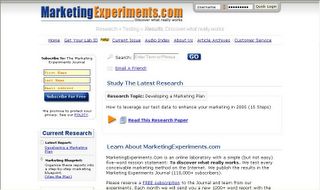 Marketing Experiments Marketing Experiments Research http://www.marketingexperiments.com/ MarketingExperiments.Com is a member of the MEC Labs Group and a division of Digital Trust Inc. MEC is an online laboratory with a simple (but not easy) five-word mission statement: To discover what really works. The Lab tests every conceivable marketing method on the Internet. Their experiments range from three to eighteen months, and they involve budgets ranging from $4500 to $100,000+. They are often surprised, and sometimes embarrassed to discover just how much they DON'T know about marketing. Through their research, they have been fortunate to collaborate with many of the Net's leading thinkers. This site has some excellent research publications and they just announced that the infornation is now freely available. This has been added to Research Resources Subject Tracer™ Information Blog. This will be added to Advertising, Marketing and Public Relations Resources 2005 Internet MiniGuide. posted by Marcus | 4:25 AM Topic Detection and Tracking (TDT) http://www.itl.nist.gov/iaui/894.01/tests/tdt/ Topic Detection and Tracking research was pursued under the DARPA Translingual Information Detection, Extraction, and Summarization (TIDES) program. Since the TIDES program ends in 2005, the timing and scope of the next TDT evaluation is contigent on resolving funding issues. More will be known early in 2005. Stay tuned to the TDT mailing list and this site for details. TDT research develops algorithms for discovering and threading together topically related material in streams of data such as newswire and broadcast news in both English and Mandarin Chinese. The overview paper "Multilingual Topic Detection and Tracking: Successful Research Enabled by Corpora and Evaluation," (Wayne LREC2000) describes in more detail the TDT program, the TDT corpora (collections of broadcast news recordings and transcripts), and the TDT technology evaluation paradigm. This has been added to Data Mining Resources Subject Tracer™ Information Blog. posted by Marcus | 4:20 AM WebFountain™ http://www.almaden.ibm.com/WebFountain/ WebFountain™ is a set of research technologies that collect, store and analyze massive amounts of unstructured and semi-structured text. It is built on an open, extensible platform that enables the discovery of trends, patterns and relationships from data. For more information on text analytics research at IBM, please visit UIMA. WebFountain™ comprises three primary components: 1) The Platform: This infrastructure incorporates third-party content and business partner technologies to provide complete customer solutions. It has integrated miners, crawlers and applications that focus on specific or global tasks and adheres to open, scalable standards; 2) The Data: WebFountain™ enables access to multi-terabyte data stores of unstructured and semi-structured data. This includes internet data, weblogs, bulletin boards, enterprise data, legacy data, licensed content, newspapers, magazines and trade journals; and 3) Multi-Disciplinary Text Analytics: WebFountain™ provides an integrated platform for multi-disciplinary text analytic approaches. This includes natural language processing, statistics, probabilities, machine learning, pattern recognition and artificial intelligence. Over 300 researchers worldwide, about 200 patents, and four years of research have contributed to this new technology. This has been added to Deep Web Research Resources Subject Tracer™ Information Blog. posted by Marcus | 4:15 AM The Future of Open Source by Ilkka Tuomi http://opensource.mit.edu/papers/tuomi3_bookchapter.pdf Abstract: Open source has seen phenomenal growth in recent years. In many ways, it has been a great success story. Yet it is interesting to study the conditions that would enable the open-source movement to remain viable and thrive also in the future. This chapter explores the driving forces behind the open source model and its constraints, discussing both the factors likely to promote the continuous growth of the open-source movement and those that could lead to its downfall. posted by Marcus | 4:10 AM Astromaterials Curation http://www-curator.jsc.nasa.gov/ "The Astromaterials Acquisition and Curation Office at the Johnson Space Center is tasked to curate NASA's current and future collections of extraterrestrial samples." The website divides the collections into six categories: Rocks and Soils from the Moon, Meteorites from Antarctica, Stratospheric Dust, Solar Wind, Space-Exposed Hardware, and Stardust Mission Samples. Besides learning how to receive and return the samples, users can find newsletters and information on discoveries made using the samples. Researchers can find out meeting dates and sample request deadlines. The website also presents the future sample collections that NASA hopes will help scientists understand the origin and evolution of the solar system and life. This has been added to Astronomy Resources Subject Tracer™ Information Blog. [From The NSDL Scout Report for the Physical Sciences, Copyright Internet Scout Project 1994-2005. http://scout.wisc.edu/] posted by Marcus | 4:05 AM D3E - Tool for Document-Centric Discussion http://d3e.sourceforge.net/ D3E is a tool for document-centric discussion. The document could be anything, from a research paper, to a policy proposal, to a multimedia student assignment. D3E makes it easy to transform an HTML file into an interactive document, tightly integrated with topic-specific or section-specific discussion threads. Check the overview for a description of the different components available. D3E started as an action research project into the social and technical design of scholarly communication technologies (see their papers for details). D3E is, however, a generic web publishing tool that has proven to have wider scope. D3E builds 100% on Open Source technologies, and is distributed as such: download client/server applications and code, and join the user/developer community! This has been added to the tools section of Research Resources Subject Tracer™ Information Blog. posted by Marcus | 4:00 AM Friday, April 08, 2005 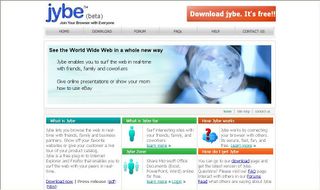 Jybe! CoSurfing Re-Invented Jybe! - CoSurfing Re-Invented http://www.jybe.com/ Jybe is a spy ware free plug-in to Internet Explorer and Firefox that enables you to surf the web with your peers in real-time. Jybe lets you browse the web in real-time with friends, family and business partners. Show off your favorite websites or give your customer a live tour of your product catalog. This has been added to the tools section of Research Resources Subject Tracer™ Information Blog. posted by Marcus | 4:25 AM Information Diffusion Through Blogspace by Daniel Gruhl, R. Guha, David Liben-Nowell, and Andrew Tomkins http://www.tomkinshome.com/papers/2Web/idib.html/idib.html Abstract We study the dynamics of information propagation in environments of low-overhead personal publishing, using a large collection of weblogs over time as our example domain. We characterize and model this collection at two levels. First, we present a macroscopic characterization of topic propagation through our corpus, formalizing the notion of long-running ``chatter'' topics consisting recursively of ``spike'' topics generated by outside world events, or more rarely, by resonances within the community. Second, we present a microscopic characterization of propagation from individual to individual, drawing on the theory of infectious diseases to model the flow. We propose, validate, and employ an algorithm to induce the underlying propagation network from a sequence of posts, and report on the results. This has been added to Bots, Blogs and News Aggregators presentation. posted by Marcus | 4:20 AM Vatican Radio http://www.vaticanradio.org/inglese/enindex.html Vatican radio broadcasts in 5 continents programmes in 40 different languages produced by two hundred journalists from 61 different countries. Vatican Radio 22 hours of simultaneous broadcasting on different frequencies, including news, live reports religious celebrations, in-depth programmes and music. Vatican radio the church point of view from topical subjects to in-depth programmes on moral questions, Vatican Radio, offers to everyone, catholic or not, the Church point of view. This has been added to Theology Resources Subject Tracer™ Information Blog. posted by Marcus | 4:15 AM Documentation of Internet Filtering Worldwide by Jonathan Zittrain and Benjamin Edelman http://cyber.law.harvard.edu/filtering/ A variety of organizations, institutions, companies, and countries seek to restrict Internet access from within their premises and territories. For example, companies may seek to improve employee productivity by restricting access to leisure sites; libraries and schools may seek to avoid exposing children to sexually-explicit content, or be required to do so; countries may seek to control the information received by their citizens generally. Common among nearly all these applications is the public unavailability of the filtering lists -- that, by the design of filtering systems, users cannot and do not know the set of specific sites blocked. In some cases users might ask for a specific site and be told of its unavailability due to filtering, but in other cases such unavailability may be conflated with unremarkable network blockages -- a Web site might be unreachable for any number of reasons, and the failure to view it at a particular moment cannot reliability be attributed to active filtering. With this project we seek to document and analyze a large number of Web pages blocked by various types of filtering regimes, and ultimately create a distributed tool enabling Internet users worldwide to gather and relay such data from their respective locations on the Internet. This has been added to Privacy Resources Subject Tracer™ Information Blog. This will be added to Security Resources 2005 Internet MiniGuide. posted by Marcus | 4:10 AM trendalicious! http://fresh.homeunix.net/delicious.html trendalicious is a near real-time view of website popularity trends as reflected by the del.icio.us social bookmarking service. All URLs that have been posted by a minimum of two people in the past fifty minutes are displayed, ranked by the total number of recent posts. This will be added to eCurrent Awareness Resources 2005 Business Intelligence Report. posted by Marcus | 4:05 AM Working Draft: RDF/Topic Maps Interoperability http://www.w3.org/TR/2005/WD-rdftm-survey-20050329/ http://www.w3.org/2001/sw/ The Semantic Web Best Practices and Deployment Working Group has released the First Public Working Draft of "A Survey of RDF/Topic Maps Interoperability Proposals." The document is a starting point for establishing standard guidelines for combined usage of the W3C RDF/OWL family and the ISO family of Topic Maps standards. The group expects to publish "Survey" and "Guidelines" Working Group Notes based on this draft. Visit the Semantic Web home page. posted by Marcus | 4:00 AM Thursday, April 07, 2005  Bots Blogs and News Aggregators Presentation Speech: Bots, Blogs and News Aggregators - The Future of the Internet by Marcus P. Zillman, M.S., A.M.H.A. Altius Group Seminar Presentation Sources: Bots, Blogs and News Aggregators by Marcus P. Zillman, M.S., A.M.H.A. http://www.BotsBlogs.com Searching the Internet - Online Streaming Video Tutorial http://www.SearchingTheInternet.info White Papers by Marcus P. Zillman, M.S., A.M.H.A. http://www.WhitePapers.us/ Advertising, Marketing and Public Relations Resources 2005 Internet MiniGuide http://AdvertisingMarketingResources.BlogSpot.com/ The latest research shows that when prospects search for your company on the Internet, the top 10 listings are likely to include the following: a) 3 listings from consumer posts to blogs, message boards, and opinion sites, b) 2 listings from experts, c) 2 listings from your own corporate site, d) 1 listing from an online publication, and e) 2 listings from other sources. This confirms the need for immediate business intelligence to constantly monitor and evaluate the prospects ongoing searching results for your company, brand, and product. Listen to my opening remarks at the Altius Group: Marcus P. Zillman, M.S., A.M.H.A., Executive Director of the Virtual Private Library™, Internet expert, author, speaker, consultant and creator/founder of BotSpot.com will be speaking on the latest happenings on the Internet with emphasis on the growing areas of bots and intelligent agents, blogs (weblogs), and news aggregators. Mr. Zillman will be showing these new resources live on the Internet and how they will relate to helping you search and find the information you require for both personal and academic research. His presentations are designed both for the “newbie” to Internet searching as well as the seasoned “Internaut”. The Internet continues to change at a record pace, and discovering the latest tools to make your Internet search both easy and competent is the goal of this presentation. Will eMail soon be replaced by RSS and news aggregators? Are blogs, currently the fastest growing area of the Internet, a fad or will they change the entire Internet landscape? These and other questions will be discussed during this presentation by one of the Internet’s pioneers and bot and artificial intelligence experts, Marcus P. Zillman. His latest links and resources are available by clicking here. Time: 5:00pm Date: Thursday, April 7, 2005 Location: Altius Group - Advertising and Brand Communications, 14540 S.W. 136th Street, Suite 102, Miami, FL 33186 Listen to some participants discussing the seminar at the end of the presentation by Marcus: posted by Marcus | 4:30 AM 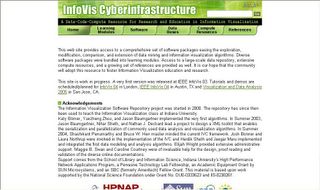 InfoVis CyberInfrastructure InfoVis CyberInfrastructure http://iv.slis.indiana.edu/index.html This web site provides access to a comprehehsive set of software packages easing the exploration, modification, comparison, and extension of data mining and information visualization algorithms. Diverse software packages were bundled into learning modules. Access to a large-scale data repository, extensive compute resources, and a growing set of references are provided as well. It is their hope that the community will adopt this resource to foster Information Visualization education and research. This has been added to Data Mining Resources Subject Tracer™ Information Blog. posted by Marcus | 4:28 AM FairUCE http://www.alphaworks.ibm.com/tech/fairuce FairUCE (which stands for "Fair use of Unsolicited Commercial Email") is a spam filter that stops spam by verifying sender identity instead of filtering content. It can stop the vast majority of spam without the use of a content filter and without requiring a probable spam or bulk folder that needs to be checked periodically. As one of the first spam filters that uses sender identity rather than email content to determine if it is legitimate, all this can be accomplished quickly using simple, inexpensive tests. Content filters require frequent maintenance (AOL estimates that spammers respond within four hours to a change in a content filter) and require a great deal of processing for complex techniques such as bayesian, heuristics, fingerprinting, etc. The techniques spammers use to get past content filters become laughable, because FairUCE doesn't look at what they say, only at who they are. It virtually eliminates spoofed addresses, phishing, and even many viruses with a few cached DNS look-ups and a couple of if/else statements. Sender identity is the spam-fighting tool of the future. The author of this technology went from over 400 spams a day to just one or two. This has been added to the AntiSPAM section of Internet Hoaxes Subject Tracer™ Information Blog. posted by Marcus | 4:25 AM de.lirio.us - Social Bookmarking, Tagging, Blogging & Notes http://de.lirio.us/ A combination of the social bookmarking, tagging & blogging phenomenons in one little package. Post website addresses you find interesting, tag then with keywords like "spain", "dog", "ipod", "posters", etc as appropriate. You can also includes a brief description, and longer detailed notes (these can also be blog posts). How's this different from other social bookmark sites? Well, for one they are including the highly useful notes feature. When you post, there is a nice long "body" section to the form. Also, the entire site is open source. See the buttons at the bottom of their page. You can hack the code in it's entirety. New and cool features are literally at -your- fingertips. Well, and your keyboard. This has been added to Social Informatics Subject Tracer™ Information Blog. posted by Marcus | 4:15 AM OASIS UBL TC Creates Small Business Subcommittee http://lists.oasis-open.org/archives/ubl/200502/msg00057.html To support the use of the Universal Business Language (UBL) OASIS Standard in small-scale e-commerce applications, the OASIS UBL TC has created the Small Business Subcommittee. These members will analyze requirements for implementations that do not require full UBL functionality and document a subset of UBL components useful for these applications. posted by Marcus | 4:10 AM IBM's Blue Gene/L Eclipses Its Previous Record By Aaron Ricadela http://www.informationweek.com/story/showArticle.jhtml?articleID=159906181&tid=5984 An IBM supercomputer already clocked as the world's fastest has surpassed its own speed record, the Energy Department reported. IBM's Blue Gene/L, being assembled for the department's Lawrence Livermore National Laboratory, performed 135.3 trillion floating point operations per second running benchmark software, the National Nuclear Security Administration said. The result eclipses the 70.72 teraflops that a smaller version of the system achieved running the Linpack benchmark program last fall. Blue Gene, which the National Nuclear Security Administration will use to simulate the performance and safety of nuclear weapons and other applications, became the world's fastest supercomputer last September, surpassing a Japanese government-funded system. The version of Blue Gene that is being assembled for the Livermore lab is currently about half its eventual size of 131,072 processors. The full-size version of the machine is expected to be operational in June or July. posted by Marcus | 4:05 AM RSS News Feed Generator http://landmark-project.com/rssnewsfeed/index.php This web tool is designed to help teachers and students create RSS feeds for aggregating news stories from 4500 sites in Google News, that are related to curriculum topics and issues. The resulting feed addresses and utilizes a feed builder constructed by Justin Pfister and can be placed in your news aggregator such as Bloglines or your own RSS news aggregator software. Many thanks to Justin for his exceedingly useful tool. Also, this web tool was inspired by the work of Will Richardson, author of RSS: A Quick Start Guide for Educators. This will be added to Education and Distance Learning Resources 2005 Internet MiniGuide. This will also be added to thr resource listing in my Bots, Blogs and News Aggregators presentation blog. This has been added to the tools section of Research Resources Subject Tracer™ Information Blog. posted by Marcus | 4:00 AM Wednesday, April 06, 2005  Centered Communication: Weblogs and Aggregation in the Organization http://incsub.org/blog/?p=336 James Farmer has posted a draft version as well as a summary of his Centered Communication: Weblogs and Aggregation in the Organization. A very interesting read and well worth a visit. Blogs are now being felt worldwide and business as well as the non for profit service sectors are beginning to feel the affects generated by this communication medium and what displacements will be happening as it takes off! This will be mentioned in my Bots, Blogs and News Aggregators presentation. posted by Marcus | 4:25 AM Cybernetics and Systems Analysis http://www.springerlink.com/link.asp?id=106467 Cybernetics and System Analysis, a translation of Kibernetica, publishes articles on: software and hardware; algorithm theory and languages; programming and programming theory; optimization; operations research; digital and analog methods; hybrid systems; machine-machine and man-machine interfacing. Simulation, pattern recognition, artificial intelligence, finite automata, switching theory, and computer logic are also covered. The journal focuses on fresh formulations of problems and new methods of investigation. Publisher: Consultants Bureau, An Imprint of Springer Verlag New York LLC. This has been added to Artificial Intelligence Resources Subject Tracer™ Information Blog. posted by Marcus | 4:20 AM Journal of Multidisciplinary Evaluation http://evaluation.wmich.edu/jmde/ Journal of Multidisciplinary Evaluation (JMDE) publishes a selection of the following types of material: 1) news of and letters or memos about evaluation activities, meetings, discussions, developments, ideas, controversies, etc., from around the world, and from evaluation publications; 2) scholarly articles about evaluation practice, methods, history, and theory of some general interest (they do not publish plain evaluation reports); 3) scholarly comments on previous material in JMDE; 4) reviews of important books or journal issues; 5) expository materials in modular form, on topics or evaluations that readers have shown some interest in clarifying; 6) evaluation puzzles or problems for competitive submissions; and 7) evaluation humor and cartoons. This isn't just a research journal. It's a journal aimed at communicating about evaluation to a very diverse readership. That may mean that it should be partly instructional, too. posted by Marcus | 4:15 AM SOAPAgent - An Open SOAP Directory http://soapagent.com/ An open SOAP Directory covering the following areas: 1) Articles (White papers and articles), 2) Forums (SOAP related discussion forums), 3) Implementations (SOAP and web service implementations), 4) News, 5) Resources (Links to other sources), 6) Semantic Web (Data Representation on the World Wide Web), 7) Services (List of web services), 8) Source Code (Source code and samples for web services), 9) Secifications (Web service specifications), 10) Tools (Tools for SOAP development), 11) Tutorials (Introduction materials for SOAP), 12) UDDI, and 13) XML (XML/XSL). This has been added to the semantic web research section of Deep Web Research Subject™ Information Blog. posted by Marcus | 4:10 AM Poets.org - The Academy of American Poets http://www.poets.org/ Poets.org is one of the many programs sponsored by the Academy of American Poets. The Academy was founded in 1934 to support American poets at all stages of their careers and to foster the appreciation of contemporary poetry. To fulfill this mission, the Academy administers a wide variety of programs, including National Poetry Month (April), the largest literary celebration in the world; the Online Poetry Classroom, an online resource providing free poetry lesson plans for high school teachers; the Poetry Audio Archive, a collection of nearly 500 recordings dating back to the 1960s; and Poets.org, our award-winning website which provides a wealth of content on contemporary American poetry and receives an average of 400,000 unique users each month. This has been added to Reference Resources Subject Tracer™ Information Blog. posted by Marcus | 4:05 AM Adherents.com: Religion Statistics Geography, Church Statistics http://www.adherents.com/ Adherents.com is a growing collection of over 41,000 adherent statistics and religious geography citations -- references to published membership/adherent statistics and congregation statistics for over 4,200 religions, churches, denominations, religious bodies, faith groups, tribes, cultures, movements, ultimate concerns, etc. Basically, researchers can use this site to answer such questions as "How many Methodists live in Indiana?", "What are the major religions of India?", or "What percentage of the world is Hindu?" They present data from both primary research sources such as government census reports, statistical sampling surveys and organizational reporting, as well as citations from secondary literature which mention adherent statistics. This has been added to Statistics Resources Subject Tracer™ Information Blog. This has been added to Theology Resources Subject Tracer™ Information Blog. posted by Marcus | 4:00 AM Tuesday, April 05, 2005 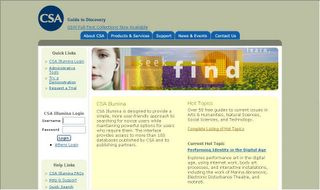 CSA - Guide To Discovery CSA - Guide to Discovery http://www.csa.com/ CSA is a worldwide information company, serving as a guide to researchers to help them be more effective in their work by enabling and expediting discovery, aiding the management and organization of quality information and providing tools to assist in its subsequent dissemination. CSA specializes in publishing and distributing, in print and electronically, 100 bibliographic and full-text databases and journals in four primary editorial areas: natural sciences, social sciences, arts & humanities, and technology. This has been added to Research Resources Subject Tracer™ Information Blog. This has been added to Knowledge Discovery Subject Tracer™ Information Blog. posted by Marcus | 4:25 AM List-u-Like CSS Generator http://www.listulike.com/ Most web-developers agree that using lists for navigation is a good idea, and styling a simple navbar is pretty easy. Yet as designs get more sophisticated, and browser-quirks multiply like coat hangers, the CSS involved can soon get rather complicated. But what if you had a tool that gave you detailed control over the appearance of a navigation list, and took account of browser variations itself - so that all you had to do was design it, and the exact CSS would be written for you..? Well now you do .... this generator program creates custom CSS for styling unorderded-lists as navigation bars, according to your design. To use the generated CSS simply paste it into your style sheet, then add the relevant class name to your list. That's the basics, but the program itself has quite a few options :-) The rest of the documentation looks at each option in detail, has articles covering aspects of design and implementation in more depth, and a selection of links to relevant external resources. This has been added to World Wide Web Reference Subject Tracer™ Information Blog. posted by Marcus | 4:20 AM Open Source Web Design http://www.oswd.org/ Open Source Web Design is a community of designers and site owners sharing free web design templates as well as web design information. Helping to make the internet a prettier place! This has been added to World Wide Web Reference Subject Tracer™ Information Blog. posted by Marcus | 4:15 AM Stats for Schools http://www.stats4schools.gov.uk./ Stats4schools, developed by the United Kingdom's Office of National Statistics, "is about helping teachers and pupils to get more from statistics." The project has posted here datasets collected by the Office for National Statistics as part of the Omnibus survey and made them available for students to download free of charge. Teachers will also find lesson plans, worksheets and datasets that can be used in their classrooms. The lesson ideas are organized by topics and involve using statistics to answer questions such as, "Do girls pull their weight more than boys at home?" and "Are you at risk from the sun?" Additional resources on teaching statistics are available from the Links section of the website. This has been added to Statistics Resources Subject Tracer™ Information Blog.[From The NSDL Scout Report for Math, Engineering, and Technology, Copyright Internet Scout Project 1994-2005. http://scout.wisc.edu/ posted by Marcus | 4:10 AM Reader's Circle: An Online Directory for Book Clubs and Reading Groups http://readerscircle.org/index.html If you've been looking for a way to connect with book-related groups, this is it. Reader's Circle is a free online directory for book clubs and reading groups. Anyone may post a listing or search for a group by zip code - all for free. But now to introduce the concept of a reader's circle. A reader's circle is a social gathering where people can drop in with whatever they're reading and share in open conversation among other readers with similar interests. Participants simply bring something they're reading or have recently read, and conversation goes from there. The intent is to loosen the usual format so participants can select their own reading and attend meetings even if they're still in the middle of a book. Conversation inevitably covers the books brought and many other subjects as well. Another feature of reader's circles is that there are three basic types: 1) Academic Reader's Circles - for serious study of a particular subject, 2) Civic Reader's Circles - serving as an informal public forum, and 3) Social Reader's Circles - primarily for getting to know people, but organized around a subject none the less; frequently an age range is also specified. This has been added to Reference Resources Subject Tracer™ Information Blog. posted by Marcus | 4:05 AM Balch Internet Research and Analysis Toolkit http://birat.net/br/ This site provides tools to create and analyze online survey instruments. Most item types are supported and the data is organized so that you can export it for further analysis with tools like Excel and SPSS. The code is public domain under the GNU public license. This has been added to the tools section of Research Resources Subject Tracer™ Information Blog. posted by Marcus | 4:00 AM Monday, April 04, 2005 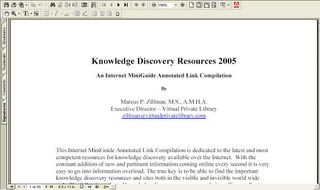 Knowledge Discovery Resources 2005 This mp3 broadcast edition of Current Awareness Happenings on the Internet by Marcus P. Zillman, M.S., A.M.H.A. April 4, 2005 V3N14 discusses Knowledge Discovery Rersources 2005. Click on the below audio mp3 broadcast to hear Marcus P. Zillman describing this annotated white paper link compilation. View this site at: Knowledge Discovery Resources 2005 http://zillman.blogspot.com/2005/03/knowledge-discovery-resources-2005.html  posted by Marcus |
4:30 AM
posted by Marcus |
4:30 AM
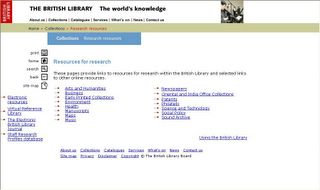 Resources for Research from the British Library Resources for Research from the British Library http://www.bl.uk/collections/resres.html These pages provide links to resources for research within the British Library and selected links to other online resources. Links include: 1) Arts and Humanities, 2) Business, 3) Early Printed Collections, 4) Environment. 5) Health, 6) Manuscripts, 7) Maps, 8) Music, 9) Newspapers, 10) Oriental and India Office Collections, 11) Patents, 12) Philatelic, 13) Science and Technology, 14) Social Policy and 15) Sound Archive. This has been added to Research Resources Subject Tracer™ Information Blog. This has been added to Student Research Subject Tracer™ Information Blog. posted by Marcus | 4:25 AM Rat Lab - Where All the Mad Scientists Go http://www.ratlab.co.uk/ Ratlab is a non-profit website that was created to spread a little science love to pretty much anyone who will listen. The site design and most of the content is by Kat, a 25 year old Microbiology PhD student who really should be reading research papers instead of playing on the net. The future plan for Ratlab is to include more content from other young scientists. This has been added to Student Research Subject Tracer™ Information Blog. posted by Marcus | 4:20 AM Travel Notice Definitions http://www.cdc.gov/travel/outbreaks.htm#noticekey CDC issues different types of notices for international travelers. As of May 20, 2004, these definitions have been refined to make the announcements more easily understood by travelers, health-care providers, and the general public. The definitions are laid out below. They describe both levels of risk for the traveler and recommended preventive measures to take at each level of risk. This will be added to International Trade Resources 2005 Internet MiniGuide. posted by Marcus | 4:15 AM University Web Developers' Mailing List http://www.usask.ca/web_project/uwebd/about_list.html The mandate of the University Web Developers' Mailing List is to provide a discussion forum for people responsible for designing, implementing, and maintaining a web site for a higher education institution such as a University. Any topic related to this audience is allowed, including technical web development and site design questions, inquiries about administrative policies at various institutions, training and conference information, useful support tools, etc. This has been added to World Wide Web Reference Subject Tracer™ Information Blog. posted by Marcus | 4:15 AM Creative Commons Yahoo Search http://search.yahoo.com/cc This Yahoo! Search service finds content across the Web that has a Creative Commons license. While most stuff you find on the web has a full copyright, this search helps you find content published by authors that want you to share or reuse it, under certain conditions. This has been added to the tools section of Research Resources Subject Tracer™ Information Blog. posted by Marcus | 4:05 AM Academic RSS Feed List Example http://ciso.uprm.edu/~feed/frames/feeds.php A very nice example of an academic RSS feed list. RSS feeds are a happening event and allow the utilization of many excellent feeds to used in one's news aggregator .... neat information..... posted by Marcus | 4:00 AM Sunday, April 03, 2005 Galaxies 1) Cambridge Cosmology: Galaxies http://www.damtp.cam.ac.uk/user/gr/public/gal_home.html 2) Galaxies Galore, Games and More http://amazing-space.stsci.edu/resources/explorations/galaxies-galore/ 3) Active Galaxies and Quasars http://imagine.gsfc.nasa.gov/docs/science/know_l1/active_galaxies.html 4) Galaxies and the Universe http://www.astr.ua.edu/keel/galaxies/ 5) Active Galaxies Newsletter http://www.ast.man.ac.uk/~rb/agn/ 6) Classifying Galaxies http://www.smv.org/hastings/student1.htm 7) Distant Galaxies and Cosmological Models http://www.cosmologymodels.com/ 8) Galaxy http://en.wikipedia.org/wiki/Galaxy This Topic in Depth presents the science and research of galaxies. First, the University of Cambridge offers clear, logical descriptions and images of the Milky Way, spiral and elliptical galaxies, clusters, and dark matter of the Universe (1). Users can also find educational tutorials on many other cosmology topics. Next, the Space Telescope Science Institute's "Galaxies Galore, Games and More is a learning module designed to allow elementary students to use their observational skills, recognize patterns, and learn how galaxies are classified" (2). Through the fun, interactive materials, students can learn about spiral, elliptical, and irregular galaxies. The third website, developed by NASA, introduces students to Seyfert Galaxies, quasars, and blazars (3). Visitors can find cool facts about the topic, quizzes, an advanced-level article on galaxies and pulsars, and additional resources. Next, Professor Bill Keel at Leiden University and the University of Alabama supplies graduate level virtual lectures on the topic of extragalactic astronomy (4). While the website is only updated to the most recent class he taught (Spring of 2003), the wealth of high-quality information offered on topics such as star formation, environmental effects on galaxies, and galaxy interactions and mergers makes it worth the visit. The fifth website, produced by the Jodrell Bank Observatory, is "an electronic publication dedicated to the observations and theory of active galaxies" (5). The newsletter promotes new papers, conferences, dissertations, employment opportunities, and more. Sixth, the Science Museum of Virginia educates users about the differences among galaxies through a series of images and clear text (6). Visitors can view images collected by the Hubble telescope and can test their skills at classifying galaxies. The seventh website, produced by National Academy of Engineering member Edward Barlow, presents concepts of general relativity and the new developments and tools used to study galaxies and other cosmological phenomena (7). The complex materials offer great examples of how models are used to help scientists understand facets of the universe. Lastly, Wikipedia offers concise explanations of the characteristics of galaxies, their history, and etymology (8). Throughout the text, visitors can find links to more information on the concepts discussed. This has been added to Astronomy Resources Subject Tracer&ttrade; Information Blog. [From The NSDL Scout Report for the Physical Sciences, Copyright Internet Scout Project 1994-2005. http://scout.wisc.edu/] posted by Marcus | 4:25 AM Pew Hispanic Center http://pewhispanic.org/ Founded in 2001, the Pew Hispanic Center is a non-partisan research organization supported by The Pew Charitable Trusts. Its mission is to improve understanding of the U.S. Hispanic population and to chronicle Latinos' growing impact on the entire nation. The Center does not advocate for or take positions on policy issues. It is a project of the Pew Research Center headquartered in Washington, DC. . The Pew Hispanic Center conducts and commissions studies on a wide range of topics with the aim of presenting research that at once meets the most rigorous scientific standards and is accessible to the interested public. The Center also regularly conducts public opinion surveys that aim to illuminate Latino views on a range of social matters and public policy issues. This has been added to Reference Resources Subject Tracer™ Information Blog. posted by Marcus | 4:20 AM DELOS Network of Excellence on Digital Libraries http://www.delos.info/ The DELOS network intends to conduct a joint program of activities aimed at integrating and coordinating the ongoing research activities of the major European teams working in Digital Library - related areas with the goal of developing the next generation Digital Library technologies. The objective is to: a) define unifying and comprehensive theories and frameworks over the life-cycle of Digital Library information,and b) build interoperable multimodal/multilingual services and integrated content management ranging from the personal to the global for the specialist and the general population. The Network aims at developing generic Digital Library technology to be incorporated into industrial-strength Digital Library Management Systems (DLMSs), offering advanced functionality through reliable and extensible services. The Network will also disseminate knowledge of Digital Library technologies to many diverse application domains. To this end a Virtual Digital Library Competence Centre has been established which provides specific user communities with access to advanced Digital Library technologies, services, testbeds, and the necessary expertise and knowledge to facilitate their take-up. posted by Marcus | 4:15 AM Terra Nova - Virtual Worlds Collaborative Blog http://terranova.blogs.com/ Terra Nova is a collaborative weblog experiment. It is about an emerging social phenomenon called "virtual worlds" -- computer-generated, persistent, immersive, and representational social platforms. Currently, the most popular virtual worlds are massively multiplayer online roleplaying games (MMORPGs), such as Everquest and Star Wars Galaxies. However, there are many other old and new varieties of virtual worlds. Posts at Terra Nova will offer news and opinions regarding the social, economic, legal, psychological, and political aspects of these worlds. They will feature scholarship, insights, and data relevant to the study of virtual worlds. This has been added to Social Informatics Subject Tracer™ Information Blog. posted by Marcus | 4:10 AM Oxford Internet Institute (OII) http://www.oii.ox.ac.uk/ Oxford Internet Institute (OII)is one of the world's first truly multi-disciplinary Internet institutes based in a major university. Devoted to the study of the societal implications of the Internet, the OII seeks to shape research, policy and practice in the UK, Europe and around the world. This has been added to Social Informatics Subject Tracer™ Information Blog. posted by Marcus | 4:05 AM Kayak.com - Travel Prices and Availability http://www.kayak.com/ Kayak.com integrates user-created reviews and ratings and other relevant travel information with real-time prices and availability. The site accesses over 100 online travel sites, providing prices and itineraries for more than 550 airlines and 85,000 hotels. This will be added to ther search engines section of all the 2005 Internet MiniGuides. This has been added to ShoppingBots Subject Tracer™ Information Blog. posted by Marcus | 4:00 AM Saturday, April 02, 2005 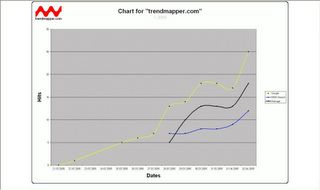 Trendmapper posted by Marcus | 6:02 AM TrendMapper http://www.trendmapper.com/ Trendmapper is a tool to generate historical data from search engines. Trendmapper contains a list of search phrases and will do a daily search for all of them. The amount of hits are recorded, and a chart is made on basis of the data that is collected. When you submit a new phrase it will be added to the list and picked up at the next search. The first chart that is generated is not interesting. You will have to wait until trendmapper has built an amount of data on your phrase. This has been added to the tools section of Research Resources Subject Tracer™ Information Blog. posted by Marcus | 4:25 AM NationalIssues.com - Focusing On The Issues Affecting America & The World http://www.nationalissues.com/ They provide up-to-the-minute news headlines and commentary on all the critical issues affecting everyday America. Their goal is to empower citizen-centric government and promote initiatives vital to protecting the health, safety and welfare of the citizens of the United States of America. Information on current policy issues facing the United States, focus on education, social security, defense, candidates, taxes, gun control, taxes, health care, technology, nanotechnology, economy, environment, discrimination, crime, labor, homeland security, space program, politics, government, supreme court, war, terrorism, free trade, nafta, cafta, ftaa, chinafta, immigration, population growth, nuclear risk, global warming and foreign policy. posted by Marcus | 4:20 AM Libweb - Library Servers via WWW http://lists.webjunction.org/libweb/ Library Servers via WWW - Updated daily at midnight, Pacific Time. Libweb currently lists over 7200 pages from libraries in over 125 countries. This has been added to Research Resources Subject Tracer™ Information Blog. posted by Marcus | 4:15 AM Internationalization Articles Published http://www.w3.org/International/articles/idn-and-iri/ http://www.w3.org/International/articles/language-tags/ http://www.w3.org/International/log/description http://www.w3.org/International/ The Internationalization GEO (Guidelines, Education & Outreach) Working Group publishes information to help authors and Webmasters understand and use W3C technologies. Recent articles are "An Introduction to Multilingual Web Addresses" and "Language Tags in HTML and XML." Read about W3C internationalization RSS feeds and news filters and visit the Internationalization home page. posted by Marcus | 4:10 AM Center for Health Services Research and Policy http://www.gwhealthpolicy.org/chsrp/ Founded in 1990, the George Washington University Center for Health Services and Policy is "dedicated to providing policymakers, public health officials, health care administrators, and advocates with the information and ideas they need to improve access to quality, affordable health care." With a staff of several dozen, the Center's work falls into a number of topical areas, such as welfare reform, HIV/AIDS, behavioral health policy, and maternal and child health. One of the first stops for new visitors should be the "Publications" section, which contains the organization's latest work (and archived materials) emanating from different research areas. The site also contains a helpful listing of relevant links and the opportunity to join the Center's managed behavioral healthcare electronic mailing list. This will be added to Healthcare Resources 2005 Internet MiniGuide.[From The Scout Report, Copyright Internet Scout Project 1994-2004. http://scout.wisc.edu/ posted by Marcus | 4:05 AM James Madison Papers http://memory.loc.gov/ammem/collections/madison_papers/ The Library of Congress announced the release of the James Madison Papers, now available on the Library's American Memory Web at the above link. The James Madison Papers from the Manuscript Division at the Library of Congress consist of approximately 12,000 items captured in some 72,000 digital images. They document the life of the man who came to be known as the "Father of the Constitution" through correspondence, personal notes, drafts of letters and legislation, an autobiography, legal and financial documents, and miscellaneous manuscripts. The collection is organized into six series dating from 1723 to 1836. Beginning with a selection of his father's letters, the series moves through Madison's years as a student, and as a member of the Virginia House of Delegates and include extensive notes of the debates during his three-year term in the Continental Congress (1779-82). Notes and a memoranda document Madison's pivotal role in the Constitutional Convention of 1787 and the Virginia ratification convention of 1788. Other materials reflect the nine years that Madison spent in the House of Representatives and his tenure as Secretary of State during Thomas Jefferson's presidency. Correspondence and notes trace his two terms as the fourth president of the United States, illuminating the origins and course of the War of 1812 and the post-war years of his presidency and subsequent retirement. The collection also includes a complete copy of Thomas Jefferson's notes from the Continental Congress of 1776. Notable correspondents include Dolley Payne Madison, Thomas Jefferson, James Monroe, Alexander Hamilton, George Washington, Edmund Randolph, Noah Webster, and Secretary of War James Armstrong, whose correspondence with Madison fills an entire series. This has been added to Reference Resources Subject Tracer™ Information Blog. posted by Marcus | 4:00 AM Friday, April 01, 2005 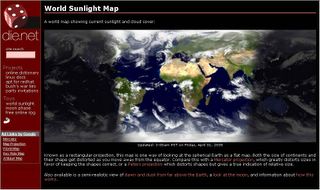 World Sunlight Map posted by Marcus | 6:20 AM World Sunlight Map http://www.die.net/earth/ A world map showing current sunlight and cloud cover. Known as a rectangular projection, this map is one way of looking at the spherical Earth as a flat map. Both the size of continents and their shape get distorted as you move away from the equator. Compare this with a Mercator projection, which greatly distorts sizes in favor of keeping the shapes correct, or a Peters projection which distorts shapes but gives a true indication of relative size. This has been added to Astronomy Resources Subject Tracer™ Information Blog. posted by Marcus | 4:25 AM Business Information Review http://bir.sagepub.com/ Business Information Review (BIR) is the only journal devoted entirely to the practice of business information provision. Its content is especially tailored to the needs of business information professionals - whether information managers, librarians, knowledge managers, researchers, analysts, consultants, print or electronic publishers. Its readers are to be found in the corporate sector, in government agencies and other public institutions, in private consultancy, and in universities and business schools. Publisher: SAGE Publications. This has been added to Business Intelligence Resources Subject Tracer™ Information Blog. This will be added to Business Resources 2005 Internet MiniGuide. posted by Marcus | 4:20 AM NewPRWiki http://www.thenewpr.com/wiki/pmwiki.php This wiki is a repository of relevant information about how the PR practice is changing, a collaboration tool for PR professionals and people interested in the practice of public relations, and an open space where anyone can ask questions, post ideas, or start a project. Who can participate: 1) anyone; you don't have to ask permission in order to post here, and 2) anonymous contributions are welcomed; signed contributions are highly appreciated. This will be added to Advertising, Marketing and Public Relations Resources 2005 Internet MiniGuide. This has been added to my Bots, Blogs and News Aggregators presentation resources. posted by Marcus | 4:15 AM Cycles in U.S. History http://www.timepage.org/time.html An interesting site bringing together a very large amount of researched information about cycles in U.S. history. Remembering the future is an interesting concept and this site brings together the research and explanation...... well worth the visit ... This has been added to Research Resources Subject Tracer Information Blog. posted by Marcus | 4:10 AM Blogs, Everyone? Weblogs Are Here to Stay, but Where Are They Headed? http://knowledge.wharton.upenn.edu/article/1172.cfm Recently, blogs have been credited with everything from CBS News anchorman Dan Rather's departure, to unauthorized previews of the latest Apple Computer products, to new transparency in presidential campaigns. The big question is whether blogs, short for weblogs, have the staying power to become more than just online diaries. Will bloggers upend the mainstream media? What legal protections should bloggers have? Is there a blogger business model? While no definitive answers exist just yet, experts at Wharton advise questioners to be patient. Blogging, they note, will be around for a long time. This will be added to my presentation Bots, Blogs and News Aggregators. posted by Marcus | 4:05 AM Music and Video Downloading Moves Beyond P2P http://www.pewinternet.org/PPF/r/153/report_display.asp About 36 million Americans—or 27% of internet users—say they download either music or video files and about half of them have found ways outside of traditional peer-to-peer networks or paid online services to swap their files, according to the most recent survey of the Pew Internet & American Life Project. The Project’s national survey of 1,421 adult Internet users conducted between January 13 and February 9, 2005 shows that 19% of current music and video downloaders, or about 7 million adults, say they have downloaded files from someone else’s iPod or MP3 player. About 28%, or 10 million people, say they get music and video files via email and instant messages. However, there is some overlap between these two groups; 9% of downloaders say they have used both of these sources. The survey has a margin of error of plus or minus 3 percent for results based on internet users. In all, 48% of current downloaders have used sources other than peer-to-peer networks or paid music and movie services to get music or video files. Beyond MP3 players, email and instant messaging, these alternative sources include music and movie websites, blogs and online review sites. posted by Marcus | 4:00 AM |
|
||||
|
|
|||||